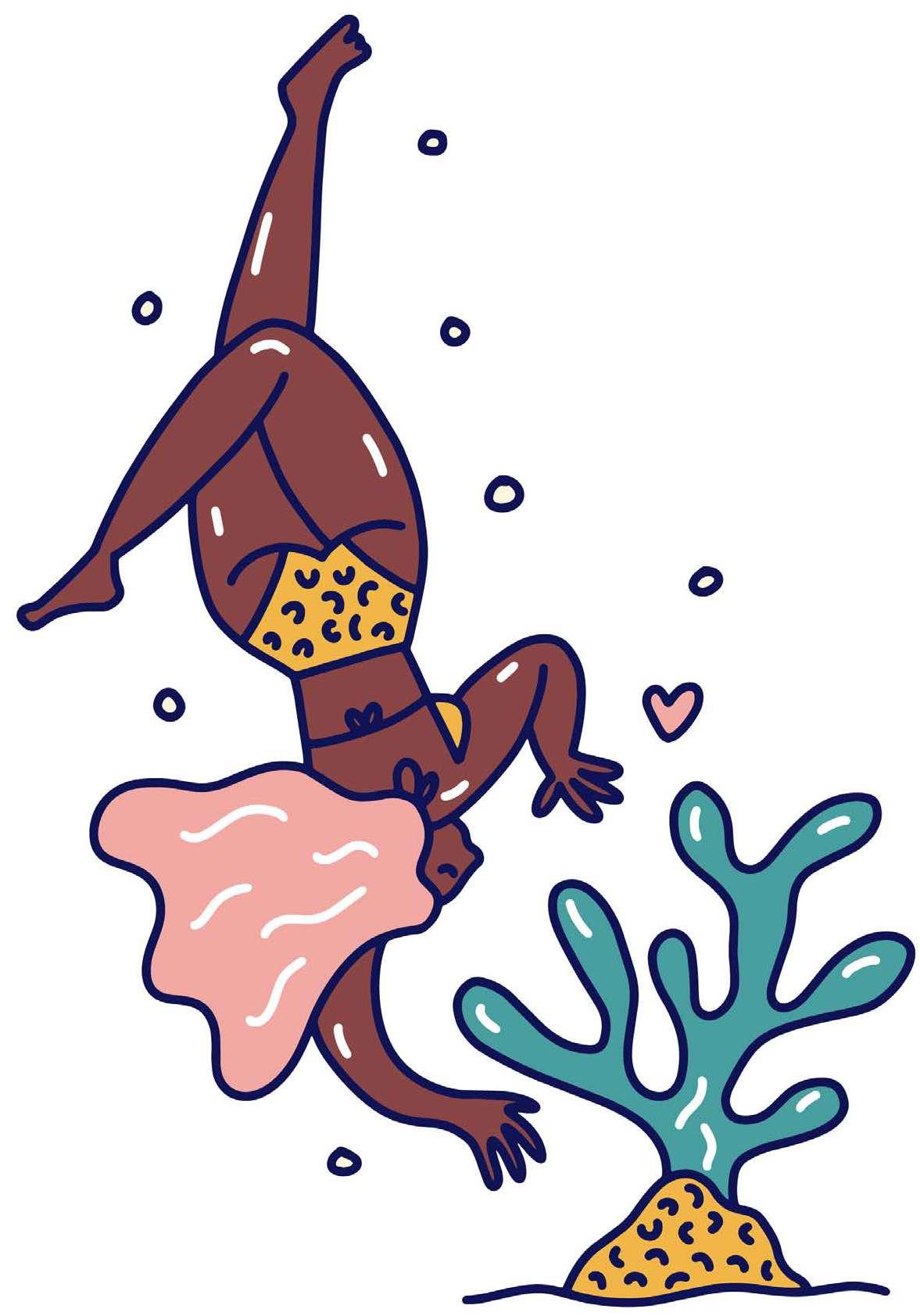
HOW WOMEN LEADERS STOP WAR
Dr Scilla Elworthy reveals why more women should be leading peace processes
WOMEN IN POWER
The energy sector lags behind when it comes to diversity –we explore why this matters
WOMEN IN FARMING
Soil Association’s Helen Browning on how equality in farming can support solutions for climate, nature and health
WOMEN’S LEADERSHIP IN ECUADOR & PERU
These female leaders are guardians of the Amazon Sacred Headwaters
INTERNATIONAL WOMEN’S DAY
MARCH 2024



Welcome to
My Green Pod Magazine!
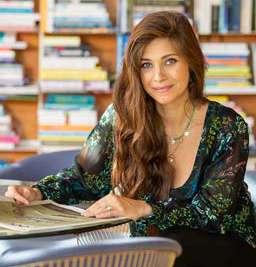 Hill, EDITOR-IN-CHIEF katie@mygreenpod.com
Hill, EDITOR-IN-CHIEF katie@mygreenpod.com
08 March marks International Women’s Day, and this year’s theme is ‘Invest in women: Accelerate progress’.
The theme for 2024 rings true on so many levels; the empowerment of women is a human rights issue, an economic imperative and a prerequisite for thriving, sustainable lifestyles on a healthy planet.
According to the UN, closing gender gaps in employment could boost GDP per capita by 20%, while closing gaps in care and expanding services with decent jobs could spark almost 300 million jobs by 2035. As things stand women currently spend around three times more time on unpaid care work than men; if these activities were assigned a monetary value they would account for more than 40% of GDP.
An additional $360 billion will be needed – per year – if we are to achieve gender equality and reap the rewards that would come with the empowerment of women. It’s a big figure that illustrates just how far we have to go. Globally, women in the paid workforce earn 20% less than men on average – a gap that jumps to 35% in some countries.
The good news is that there are women all over the world who are driving positive change – in their own sectors and beyond – and serving as beacons of hope for the rest of us. In this issue we wanted to introduce you to some incredibly inspiring women who are pushing for a brighter, fairer future for everyone – in the workplace and beyond.
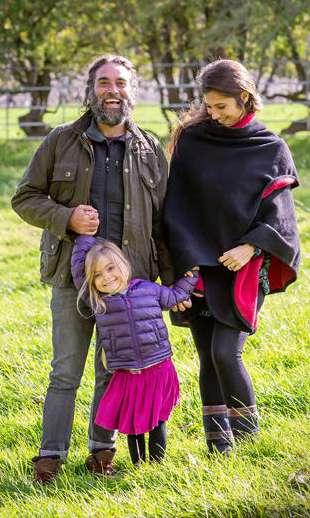
ABOUT US
My Green Pod is an independent, family-run UK business, founded by Katie Hill and Jarvis Smith. We want to share the real stories behind the brands and people working tirelessly to offer ethical alternatives to mainstream products and services. You might not see these options on the high street and they may not be the first to appear in online searches. But they are on mygreenpod.com.
Use the search bar to find conscious lifestyle inspiration –and you could save some cash along the way!
CONTACT US

Just 3% of all underwear is sustainably sourced Peace agreements involving women are 35% more likely to last 15 years


Subscribe to get each digital issue of My Green Pod Magazine delivered straight to your inbox mygreenpod.com/subscribe @mygreenpod f facebook.com/mygreenpod

Women are responsible for 80% of all consumer spending
mygreenpod.com INTERNATIONAL WOMEN’S DAY 3
PHOTOGRAPHY
ISTOCK
Katie


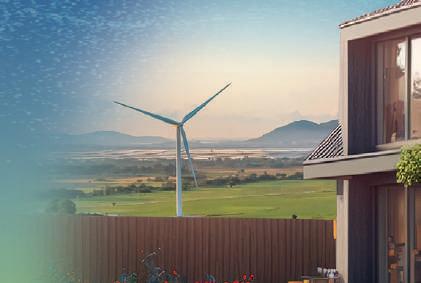


















































































































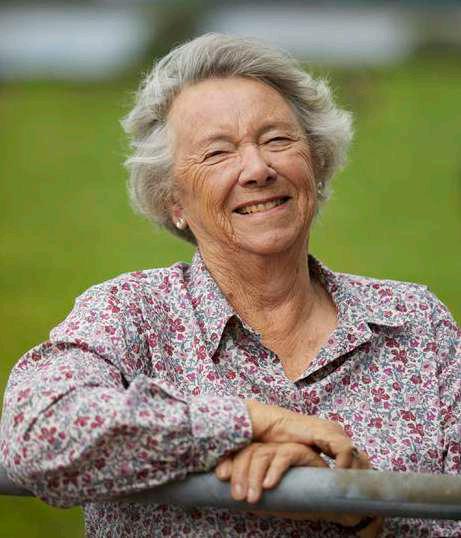
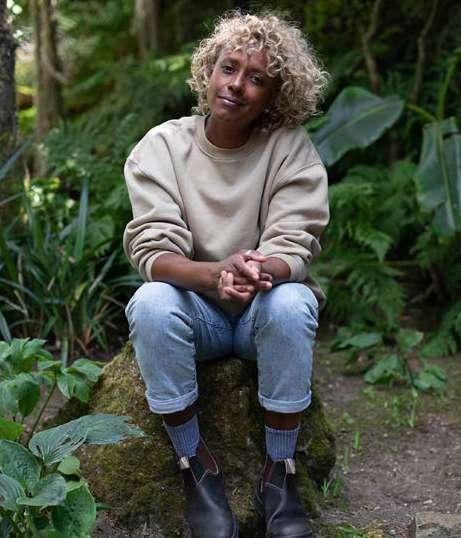
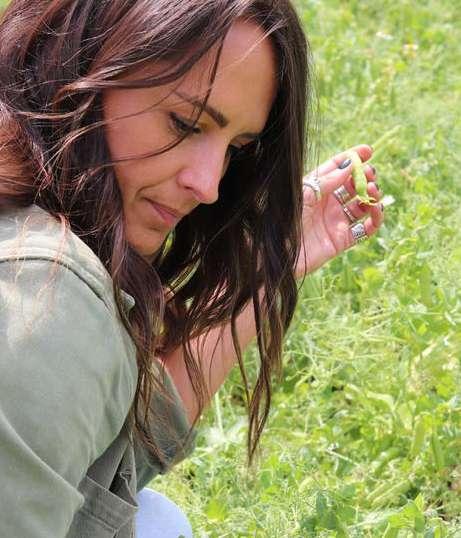
NEWS
06 Dr Scilla Elworthy explains how women leaders stop wars
08 EARTHDAY.ORG’s Kathleen Rogers is proof that women can change the world
BUSINESS
09 This year’s P.E.A. Awards are selected by an all-female judging panel
10 Sustainability is complex – and for Tina Karme, filled with opportunities
MONEY
12 10 years of positive investments –and the future of impact investing
14 UK’s top workplace pension providers ranked on climate action
HERO PRODUCTS
15 My Green Pod Heroes for March, plus our Top 5 Switches
ENERGY
16 The energy sector lags behind when it comes to diversity –this is why it matters
18 Slash bills and emissions: turn your home into a virtual power plant
HOME & GARDEN
19 Interior designer Chloe Bullock shares how she hopes to inspire positive change in the sector
20 Could your pet’s shampoo be affecting their behaviour?
FOOD & DRINK
21 In a male-dominated drinks industry, women can bring a new perspective
22 Soil Association’s Helen Browning on diversity in farming
23 Mary Mead OBE reflects on her role in Britain’s largest organic brand
24 Why to say ‘I do’ to a sustainable wedding at River Cottage HQ
25 Why shade-grown coffee is set to be the next big thing
26 This one-stop shop for organic superfoods has a multi-cultural approach to wellbeing
HEALTH & BEAUTY
27 Natural beauty expert Janey Lee Grace spotlights the female entrepreneurs who are shaping sustainable beauty
ART & FASHION
28 Gillian Burke says we need to shine a light on the invisible barriers to positive change
29 Introducing Green Britain TV, the new platform showcasing solutions to the climate crisis
30 Model twins Brett and Scott Staniland reveal the brands to celebrate this International Women’s Day
CONSCIOUSNESS
31 Meet the guardians of the Amazon Sacred Headwaters
32 Jarvis Smith believes we can change the world by embracing feminine principles and leadership
33 Why we must listen to intuition and create a balance that allows the feminine to thrive
COMPETITIONS
34 Take a look at the latest competition giveaways featured on mygreenpod.com!
23 mygreenpod.com INTERNATIONAL WOMEN’S DAY 5 Distributed by My Green Pod which takes sole responsibility for its contents. MGP does not accept unsolicited contributions. Editorial opinions expressed in this magazine are not necessarily those of My Green Pod and the company does not accept responsibility for advertising content. Prices are correct at time of going to press and are subject to change. The Publishers cannot accept any responsibility for errors or omissions. The contents of this magazine are fully protected by copyright and may not be reproduced without written permission. If you have any queries relating to the magazine call 0203 002 0990.
Katie Hill DESIGN: Suzanne Taylor PUBLISHER: Jarvis Smith PUBLISHING: My Green Pod CONTENTS
EDITOR-IN-CHIEF:
21 28
How women leaders STOP WAR
By Dr Scilla Elworthy
Most of humanity now stands with its mouth open, aghast at the endless repetition of terrifying violence we are witnessing. Some people assume that new and better methods of killing will render ‘victory’ and that will solve the problem. It won’t. Why? Because the cycle of violence will not have been interrupted.
The cycle begins with an atrocity. The result is shock, followed by fear, followed by grief. Then comes anger; if nothing is done, anger becomes bitterness, demanding revenge and retaliation, resulting – of course – in another atrocity.
With this article I would like to show you how this cycle of violence can be broken, why women must be included, how more women can be leading peace processes and what we can do now to support them.
PEACEFUL NEGOTIATION
Breaking the cycle of violence demands a different mentality and different skills. It requires courage and understanding; representatives of opposing sides who refuse to talk must be approached separately by intermediaries they trust, and who are able to liaise with each other. This is an extremely
challenging process that requires deep courage, patience and profound understanding.
An initial first meeting should be secret, and often with only one or two representatives of either side, who will usually state their demands and bottom lines. This is likely to be contentious and fractious, but if this process can be handled with care, it may begin to suggest some possible advantages for either side – and they may agree to send more senior people to a further meeting.
The next round of talks must be guided by listening. Skilled mediators will insist that includes listening not only to the demands of each side, but also to their deeper needs. Tensions will arise; compassionate communication must be used to defuse tension fast.
Gradually, after many meetings, it becomes possible to share accounts of what has been experienced by either side, and for these accounts to be heard compassionately so powerful feelings are less likely to feed the vicious cycle.
These short examples do not begin to describe the immensely complex and demanding process of negotiation, but they suggest the advantages of female skills in conflict prevention and resolution.
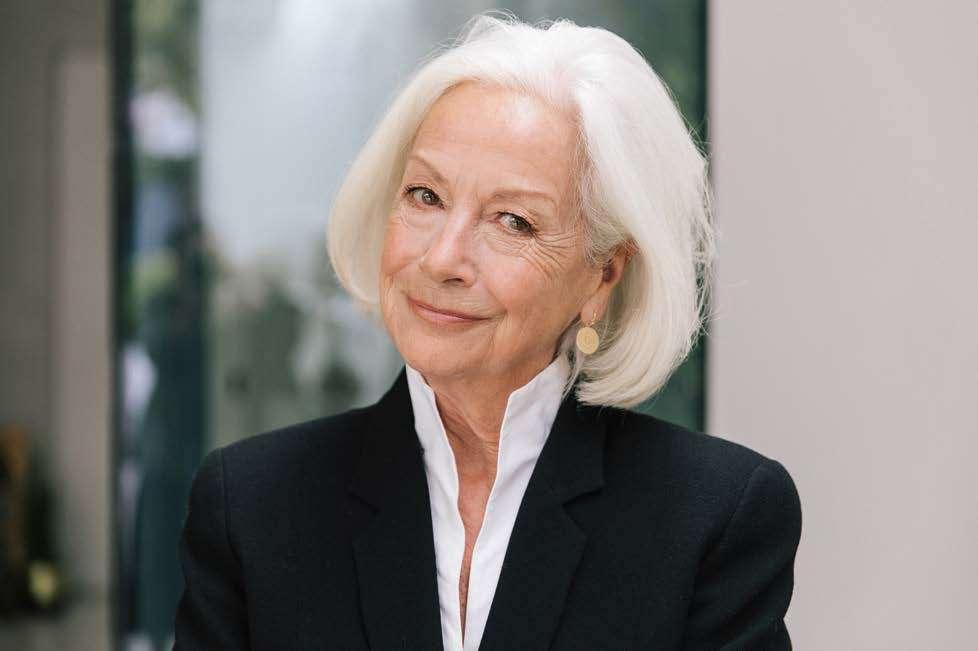
WHY INCLUDE WOMEN?
Since women are not usually instigators of cycles of violence, they start from a different place, bringing less charged emotional baggage with them. They can be freer to empathise with others whom men may see only as enemies.
Women tend to use intuition to enable parties to understand what’s needed in the moment. The male need for revenge is often triggered by shame and feelings of humiliation, including a failure to protect women whom they love. Revenge seems like the only way to alleviate these feelings and restore their sense of pride. Women can take a more long-term view and think more creatively about what might support a long-term peace.
A balance of women in negotiating teams has been shown to help reach a peace deal that lasts longer. A statistical analysis of 182 signed peace agreements between 1989 and 2011 revealed that peace agreements where women are involved are 35% more likely to last for 15 years.
The ‘secret back channels’ – crucial in resolving conflicts – can most effectively be carried out by women; the ability to speak truth to power, without provoking hostility or violence, is invaluable.
WOMEN IN PEACE PROCESSES
So in practice, how could more women be leading peace processes? First, we need to make known women’s track records in preventing or resolving armed conflicts and the principles they used.
ABOUT DR SCILLA ELWORTHY
Dr Scilla Elworthy is a threetime Nobel Peace Prize nominee for her work with Oxford Research Group to develop effective dialogue between nuclear weapons policy-makers worldwide and their critics. She founded Peace Direct in 2002 to fund, promote and learn from local peace-builders in conflict areas, was awarded the Niwano Peace Prize in 2003
and advised Peter Gabriel, Archbishop Desmond Tutu and Sir Richard Branson in setting up The Elders. Her TED Talk on nonviolence has been viewed by over 1,500,000 people.
In 2017 Scilla founded The Business Plan for Peace to help prevent destructive conflict and build sustainable peace throughout the world, because it is possible.
6 INTERNATIONAL WOMEN’S DAY mygreenpod.com
Enabling people on the ground from dissonant communities to meet, talk and march together shows their leaders that they unite for and insist on a peaceful future.
In Northern Ireland, where sectarian killings had escalated to crisis levels, Betty Williams and Mairead Maguire co-founded the Community for Peace People and mobilised over 10,000 Catholic and Protestant women to march and advocate for peace from 1974 to1980, risking their lives to do so. They received the 1976 Nobel Peace Prize for their efforts to bring about an end to hostilities.
INTERFAITH ACTION
Another effective principle is to unite in an interfaith movement and prevent male negotiators from leaving talks until agreement is reached.
In Liberia, after a 14-year civil war, Leymah Gbowee united Christian and Muslim women in an interfaith movement, the Women of Liberia Mass Action for Peace. The women acted as intermediaries between Charles Taylor and rebel leaders and even carried out sex strikes to stop the men from fighting. Their efforts laid the foundations for Ellen Johnson Sirleaf to become the first female African head of state.
In 2011, both Gbowee and Johnson Sirleaf were awarded the Nobel Peace Prize.
USING NETWORKS
Using female networks alongside the latest tech to map the spread of violence enables strategies to bring violence under control to prepare for a planned peace.
In Kenya, when violence erupted after disputed elections in 2007, Dekha Ibrahim Abdi asked the 60,000 members of a women’s organisation to report what they saw on cell phones.
The information pouring in enabled them to plot not only the ‘hot spots’ of violence but also the ‘cold spots’ – where people were running for protection. They then developed strategies for each spot, with the help of trusted local leaders. In less than three weeks these strategies brought the violence under control.
EMBRACING THE BASE
Combining women’s courage with their determination to end the use of cruise missiles may have taken 10 years, but it worked in the end.
In the UK in 1981 the Greenham Common Women’s Peace Camp was set up to protest against nuclear cruise missiles at the RAF camp there. A year later, 30,000 women joined hands around the base to Embrace the Base with their children.
The courage of the Greenham women hit the headlines again when a small group climbed the fence to dance on missile silos on New Year’s Day 1983. The media attention surrounding the camp inspired people across Europe to create other peace camps. The last missiles left the base in 1991.
PEACE AGREEMENTS THAT LAST
There is evidence to demonstrate that when women lead and make up more than one-third of
those negotiating a peace treaty, the process will produce agreements that last.
In the Philippines in 2014, when Miriam CoronelFerrer led the government’s negotiating team, she was the first woman to sign a major peace deal. This treaty provided a framework for ending the 40year conflict between the Filipino government and the Moro Islamic Liberation Front (MILF), a rebel group that hoped to create an independent Muslim majority state.
Women made up 33% of that negotiating team and 25% of the signatories.
GENDER SUB-COMMISSIONS
A gender sub-commission should be included in every peace negotiation, for future women’s rights and protection from violence.
In Colombia a peace treaty was signed in 2016 to bring an end to the 50-year conflict between the government and the Revolutionary Armed Forces (FARC). The conflict had claimed over 200,000 lives and had displaced about 7 million people.
Finally, women made up 20% of the government team and 43% of the FARC negotiating team. It was the first time a gender sub-commission had been included in a peace negotiation. The final treaty included a range of provisions for women.
SEARCH FOR COMMON GROUND
Individual courage can enable women to become leaders even under the most oppressive regimes.
After the Taliban came to power, Afghanistan became perhaps one of the last places you might expect a young woman, aged 14, to attend international peace talks.
Zuhra’s dedication to peace and to her country enabled her to become a powerful programme director – currently the only woman leading a network of civil society organisations in Afghanistan. Through her leadership and bravery, Search for Common Ground is now the backbone of the largest network of civil society activists in the country, involving over 100 organisations.
FEMALE NEGOTIATORS
Next, in conflicts we know of, we need to put forward names of skilled female negotiators to lead the peace process.
Catherine Ashton, a British Labour politician who had worked at the Campaign for Nuclear Disarmament (CND), served as the High Representative of the Union for Foreign Affairs and Security Policy and First Vice President of the European Commission from 2009 to 2014. She negotiated truce in Serbia/Kosovo.
Mary Robinson, the first woman President of Ireland (1990-1997), former UN High Commissioner for Human Rights and chair of The Elders, is a passionate advocate for gender equality and women’s participation in peace-building.
Find out more
Lehmah Gbowee and Ellen Johnson Sirleaf helped end the Liberian civil war by organising hundreds of women to stop male negotiators leaving peace talks. In 2011 they were awarded the 2011 Nobel Peace Prize ‘for their non-violent struggle for women’s right to full participation in peace-building work.’
Margot Wallstrom, Deputy Prime Minister of Sweden and Minister for Foreign Affairs from 2014 to 2019, was Minister for Nordic Cooperation from 2016 to 2019.
Christiana Figueres, appointed Executive Secretary of the UN Framework Convention on Climate Change in July 2010, steadily rebuilt the global climate change negotiating process that led to the 2015 Paris climate agreement, which is widely recognised as a historic achievement.
By recounting the atrocities perpetrated against her, Nadia Murad, member of the Yazidi minority in Northern Iraq, helped ensure that future generations of young women do not become victims of sexual violence in war. She won the Nobel Peace Prize in 2018.
Jacinda Ardern became the youngest prime minister of New Zealand in 2017. When she defused racism in Christchurch after a terror attack, the Guardian wrote that she ‘moulded a different consensus, demonstrating action, care, unity. Terrorism sees difference and wants to annihilate it. Ardern sees difference and wants to respect it, embrace it and connect with it.’
WHAT CAN WE DO NOW?
It may be that reading this, you feel inspired to research any conflicts you care about and perhaps put forward names of skilled female negotiators to lead the peace process.
You may like to wake colleagues to notice the gender of leaders in armed conflicts. Count how many women you can see. Do the same for those around peace tables. Make these numbers known. The more we wake up to the absence of women in negotiating on war and violence, the more likely we are to have conflicts resolved.
If you prefer to work at a more local level, have a look at conflicts in your area, in your workplace, in your kids’ school. Get advice and begin to read up on similar disputes.
Take your courage and your phone in your hands, talk to a few competent, imaginative women who you feel would be able to put forward proposals for talks. Gather them round a kitchen table somewhere. Listen. Make notes. Form a plan. Soon you’ll have a team of competent practical women to suggest what could be done, and how. Set it out in a good presentation. See what happens. If you get stuck, tell your local media.
This is how we learn. It’s how most of those women in the stories above got going – and it’s much better for our health than wringing hands.
n More about Scilla’s work and her latest books – The Business Plan for Peace: Building a World Without War (2017), The Mighty Heart: how to transform conflict (2020), and The Mighty Heart in Action (2022) – is at scillaelworthy.com
n View Scilla’s global work at planforpeace.org
mygreenpod.com INTERNATIONAL WOMEN’S DAY 7 NEWS
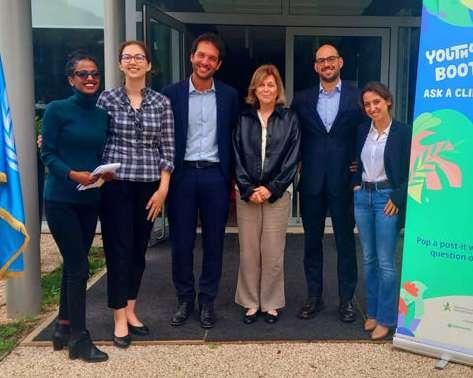
Rachel Carson’s groundbreaking book, Silent Spring, ignited the modern environmental movement by exposing the harmful effects of pesticides and their devastating impact on wildlife.
Through the Green Belt Movement, Wangari Maathai was able to empower Indigenous Kenyan women to combat deforestation and advocate for women’s rights.
Today, activists like Greta Thunberg and Mavi Brilhante are the leading voices demanding action, inspiring a new generation to confront climate change head-on.
EMPOWERING WOMEN
It’s evident women have long been pivotal in driving environmental action; a report from Project Drawdown underscored this connection when it revealed that empowering women and girls in developing countries is the second-most effective solution for limiting global warming to 2ºC.
Investing in the education of women and girls in these regions is paramount. Kathleen Rogers, president of EARTHDAY.ORG, has spearheaded efforts to champion equitable and universal climate education throughout her career as an environmental activist.
‘When girls are educated they are empowered to do the right thing by the planet’, Kathleen said. ‘And, once women take action, their families, colleagues and friends follow. We – women and girls – are a force to be reckoned with and I am deeply proud of those who have gone before me, and the ones who will follow.’
GREEN MUSCLE MEMORY
For over 20 years under Kathleen’s leadership, EARTHDAY.ORG has tirelessly advocated for the planet’s health. Kathleen has championed the need for climate education in every school as a means to teach the next generation about the ways in which they can contribute to, and also advance, the new green economy.
Climate education helps to develop a ‘green muscle memory’, which instinctively fosters positive action for our planet.
With programmes like The Canopy Project and The Great Global Cleanup in more than 192 countries, Kathleen and EARTHDAY.ORG have prioritised the integration of civic participation into all their initiatives and activities.
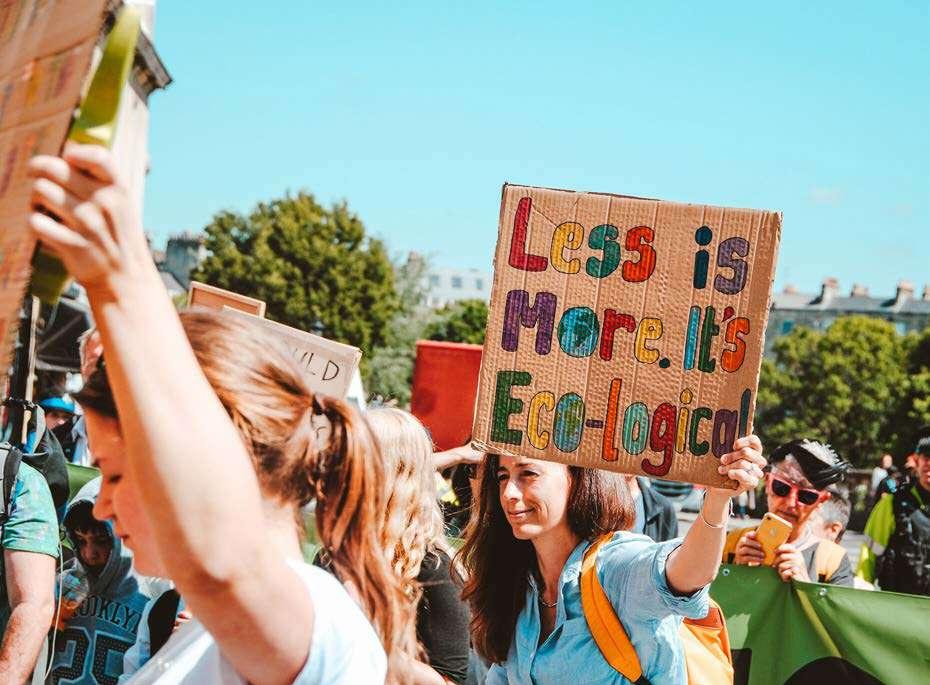
EMPOWERING WOMEN
EARTHDAY.ORG’s Kathleen Rogers is proof that women can change the world
A GREEN SISTERHOOD
Kathleen’s upbringing in a large family, coupled with a love for animals and exploration, deeply influenced her journey to environmental activism. Having travelled to over 105 countries and attended 27 COPs with EARTHDAY.ORG (she missed Poland, which she still regrets), Kathleen brings a unique perspective and dedication to her advocacy. ‘I truly believe you have to get out there and connect with people, face to face, to really sell the virtues of environmentalism’, Katheen said. ‘One of the great joys of my job is that I get to meet, work with and learn from literally thousands of other women. I feel like I am part of a powerful green sisterhood! It gives me a lot of strength to know we are fighting for what is right, together.’
A SUSTAINABLE FUTURE
One of Kathleen’s most memorable experiences was organising the first major environmental event in Ukraine in 2005, in the aftermath of the Chernobyl disaster.
Despite the challenges – which ranged from extreme weather to mismanagement – Kathleen and her team successfully rallied 150,000 people in a snowstorm to take action for the environment.
As we celebrate International Women’s Day, let’s honour trailblazers like Kathleen, whose lifelong commitment to climate education helps to empower young women. Her dedication should inspire us all; most of all it shows girls all over the world that they can make a difference and that they do have a voice.
Through her leadership and advocacy, Kathleen has given us another section of the roadmap in our journey to a sustainable future.
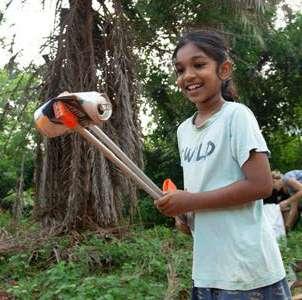
8 INTERNATIONAL WOMEN’S DAY mygreenpod.com NEWS
Find out more n Discover more about EARTHDAY.ORG’s history and victories to date at earthday.org/about-us
CLOCKWISE Women marching at an Earth Day 2023 rally in Washington, D.C.; a cleanup hosted by Earth Day Network India and Uttarayan Wildlife; Kathleen Rogers with fellow climate education champions at the Youth 4 Climate booth in Brazil
Women select eco champions
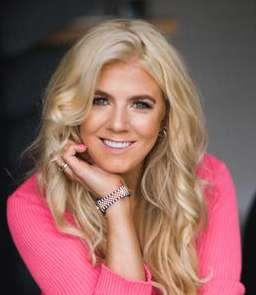
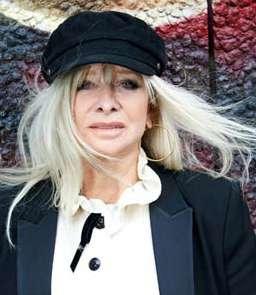

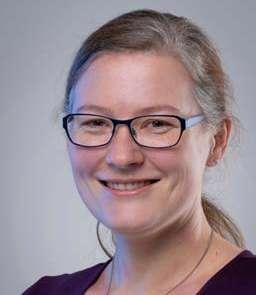
The P.E.A. (People. Environment. Achievement.) Awards is the UK’s leading sustainability and climate awards, honouring the individuals and teams behind the products, services and businesses that are changing the face of our planet. Across sectors ranging from art to finance, the P.E.A. Awards identifies and celebrates the green heroes who are taking matters into their own hands and providing inspiring alternatives to business as usual.
The judging panel for this year's P.E.A.s is all female; each judge combines sector expertise with a strong desire to preserve the fragile environment we live in. Here’s why they were invited to be involved.
CAT FLETCHER
Cat is a waste activist and all-round resource goddess. An Australian mother of three, she's a founding member, director and head of media for Freegle, a UK online reuse network with 2.6 million members. Cat is a regular and much-loved face on the P.E.A. Awards judging panel and keeps things on track with her no-nonsense approach to sustainability and ethical living.
EMILY CROMWELL
Emily is a director in Deloitte’s Sustainability practice. A lawyer and a regulatory specialist, Emily leads Responsible Business for the Consumer Industry in the UK and advises clients on sustainability issues including decarbonisation, TCFD, human rights, sustainability strategy and circularity. She leads the ethical value chain ecosystem for Deloitte UK, which is made up of internal capabilities augmented by an external network of innovative tech companies. Emily has delivered global, multi-disciplinary projects for over a decade and is deeply experienced in driving programmatic change.
JAYN STERLAND
Jayn is managing director of Weleda (UK/Ireland) and a global spokesperson for the company.
Joining Weleda was, she says, ‘a culmination of everything I had learnt up to that point – having grown up on a farm and learnt how to make medicines from my herbalist gran, watching mum care for her patients and the family as a community doctor – I found all this at Weleda and I feel as though I have come home.’
An energetic environmental activist and a campaigner for responsible business, Jayn consistently appears in the UK Top Five ‘Who’s Who in Natural Beauty’, and is the newly appointed chair of the British Beauty Council’s Sustainable Beauty Coalition.
JORDAN BROMPTON
Jordan bubbles with enthusiasm for anything to do with renewables or electric vehicles and is extremely passionate about doing her bit to create a more sustainable future.
With several years’ experience within the industry – and a whole career in sales and marketing –Jordan is the driving force behind
the myenergi brand and a key player in bridging the gap between renewable energies and electric vehicles.
JO WOOD
Jo is a pioneer and committed supporter of all things organic and natural. She is the founder of Jo Wood Organics, a successful and award-winning organic fragrance and beauty range, and recently moved to a home she has taken off grid. Jo's philosophy 'is about respecting our bodies and our Earth. If we work with Nature, rather than abusing it, we will all reap the benefits.’
KATIE HILL
Katie Hill is co-founder and editor at My Green Pod. Before that she was a senior writer, researcher and a deputy editor at Which? magazine, and headed up the Indian equivalent in Mumbai.
With My Green Pod, Katie has combined her experience in investigative journalism, consumer rights and independent media with passions for climate justice, women’s rights, clean living and the environment. She frequently writes about the importance of detecting corporate sideshows that can slow the shift to a more conscious lifestyle.
Katie is also a speaker, regular judge for the coveted Beauty Shortlist Awards and Mama & Baby Awards and a UN Women UK delegate.
l

RUTH EASTER
A qualified solicitor with over 15 years’ experience, Ruth is the legal lead for the UK’s largest (fiercely!) independent web host, Krystal Hosting. A champion of inclusivity and environmental awareness, Ruth devotes her career to promoting and codifying the principles central to Krystal’s ethos.
Ruth’s passion for ethical leadership keeps her involved in all sustainable initiatives at Krystal, including its B Corp accreditation and Living Wage Employer status. She applies her legal skills and environmental knowledge to help Krystal staff understand the power of pensions, change to 100% renewable providers and make the switch to eco products.
STEPHANIE JORDAN
Born in London to a British mother and Colombian father and raised in Burgundy, Stephanie's unique cultural upbringing sparked her passion for the drinks and hospitality industry.
After an eight-year stint at Diageo Stephanie established her own drinks brand consultancy, Drinking Out Loud, and co-founded award-winning and sustainability-minded Avallen Spirits, a calvados brand on a mission to save bees and become the world’s most planet-positive spirits brand.
Stephanie was named ‘Woman of the Year 2020’ by The Drinks Business and loves to take time to mentor young women in business.
BUSINESS
This year’s P.E.A. Award winners will be selected by an all-female judging pane
Find out more n For event information and ticket details, visit peaawards.com
mygreenpod.com INTERNATIONAL WOMEN’S DAY 9
Jordan Brompton
Jo Wood
Katie Hill
Ruth Easter
Stephanie Jordan
Making sense of SUSTAINABILITY
Sustainability is complex – for Tina Karme, that is why it is filled with opportunities
Forget what the critics might say: what if sustainability and other complex issues are not about bad people making bad decisions, and instead about many people struggling to make sense of complex, intertwined challenges?
This is the conclusion of Tina Karme, whose recently published Doctoral thesis at Luxembourg’s European Business University focuses on sensemaking and sensebreaking in complexity.
While many focus on bad decisions and finding a guilty party to blame, Tina’s research looks at how actors make sense of complex issues and the decisions that follow on from that process.
MAKING SENSE OF THE WORLD
According to Tina’s research, we are all continuously making sense of the world around us; first we try to work out what the story is and then we concentrate on what we are supposed to do about it – how we are supposed to act.
In a bid to make sense of what is going on at the time – or work out ‘the story’ – people talk things into existence. Tina uses the example of the energy crisis in Europe. ‘It started as a dialogue and suddenly a story emerged that helped us to understand what was happening, how it impacted us and what we could do’, she tells us.
Once the story emerged, many quickly started considering what actions to take. We can see the result of this process; it had a big impact on the energy savings Europe was able to make during the winter of 2022-2023.
‘No one is ever 100% wrong’, Tina tells us, ‘but the stories we tell might differ as a result of how we make sense of the world around us. We need to move beyond right and wrong and show curiosity towards all the stories and ways of understanding the world. They play a big part in making sense of complex issues and all of them are needed.’
BREAKING OR BOLSTERING SENSE
Tina’s research found that we have, for a long time, engaged with both simple and complicated issues. ‘There is a framework called the Cynefin Framework that focuses on five dimensions’, Tina explains; ‘Simple, Complicated, Complex, Chaos and Disorder. Simple is the best-practice solution that most business runs on. Complicated presents several best options to choose from, and a team of experts usually develops
ABOUT TINA KARME
Tina Karme is a Doctor of Business Administration with a Master of Science (M.Sc) degree from Finland in Business Management and a M.Sc degree from the UN Institute of Training and Research collaboration programme with Franklin University Switzerland on International Management and Sustainability.
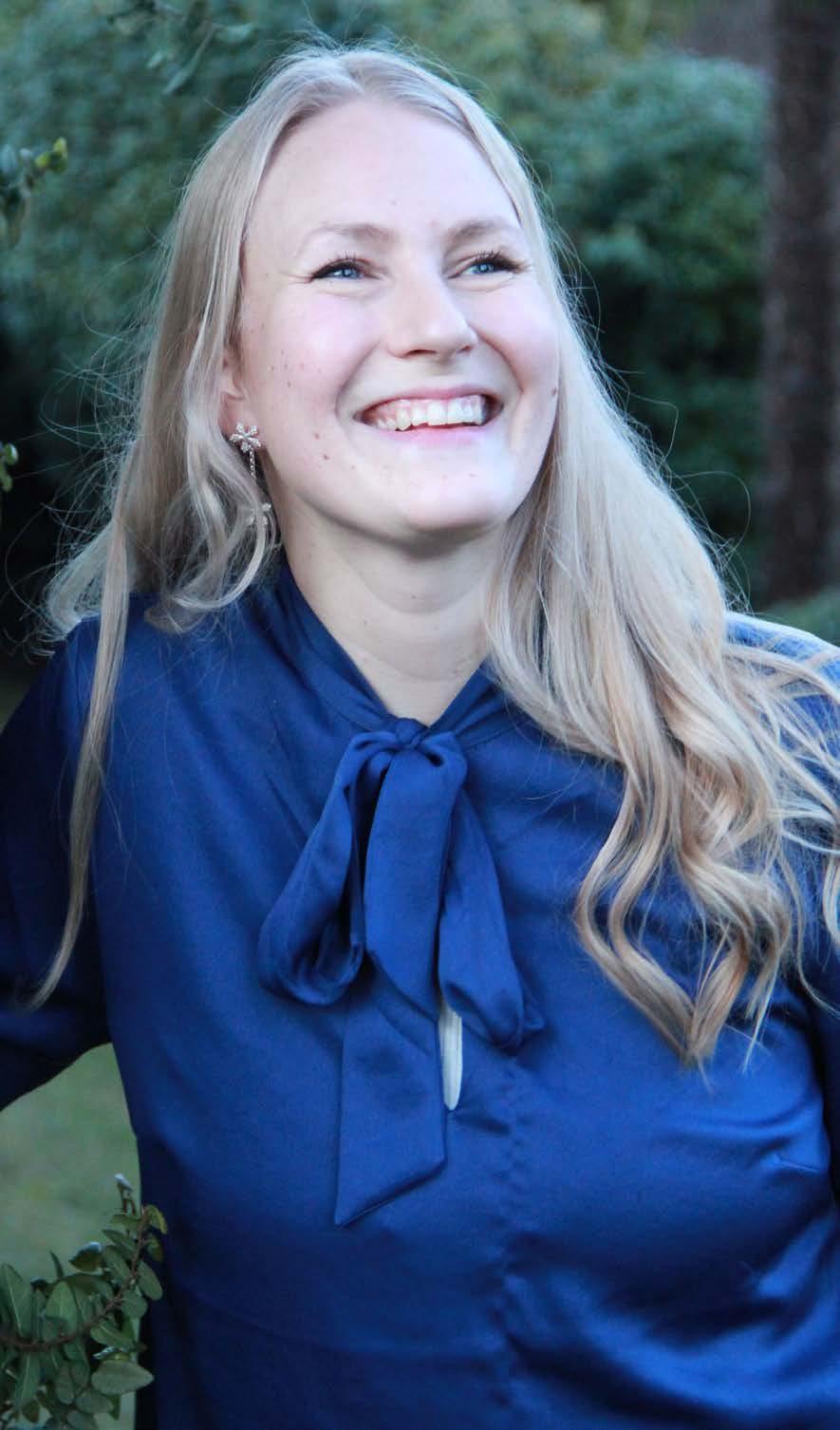
10 INTERNATIONAL WOMEN’S DAY mygreenpod.com
them. Most of our leadership and business models are grounded in simple and complicated matters that can be managed. These issues have clear cause-effect relations, and things are known or knowable.’
But when it comes to sustainability issues, such as climate change and biodiversity, there are no clear or manageable cause-effect relations. ‘They are complex chains and webs of loops’, Tina explains. ‘There are many unknown factors and unknowable elements. This means that we operate in surroundings where patterns unfold as we move through time.’
In simple terms, things will emerge – but new ideas and solutions will only appear if we are open to them and can let go of old ways, patterns and ideas.
This is where it gets difficult: how do we let go of things that no longer serve us? Tina developed a process of sensemaking which shows that when our current ways of understanding the world are disrupted, it can lead to sensebreaking or the fortification of common sense.
‘Fortification of common sense means that you start defending your way of being, acting and understanding the world’, Tina tells us. ‘This often leads to focusing on who is right and wrong, and at times, it is very polarising. Nothing new will emerge from this; in fact, research is often used to strengthen what we think we know.’
For Tina what is needed is sensebreaking, which creates a gateway to new sense. ‘Sensebreaking means that our understanding of a specific thing falls apart’, she explains. ‘This creates a void that needs to be filled.’
Sensebreaking can be achieved in a number of ways, but for Tina the most important thing is that it should focus on talking new things into existence. Rather than relying on past knowledge and understanding, new trains of thought and new ideas need to emerge. This way, we innovate and develop –we ‘evolve’, as Tina puts it.
AVOIDING TENSIONS
Research on temporary sensemaking discusses three elements: prefigurative, configurative and refigurative sensemaking. Prefigurative is grounded in things we already know, while configurative and refigurative sensemaking involve new things being talked about and acted into existence.
Configurative focuses on understanding the story, and can be informed by the future. Research shows that the more inclusive we can be in the process of configurative sensemaking, the more efficient it will be as its purpose is to challenge assumptions. However, these challenges create tensions. If tensions are not dealt with by tools other than dominance and compromise, nothing new can emerge.
Research suggests a third option, integration, as an alternative pathway for solving tension. As one person told Tina in her interviews, if a vegetarian and a meat producer make a compromise to put half a steak on the plate, that is not a solution. Integration requires something completely new to emerge – an idea or solution that was not on the table at the start, and that satisfies both needs.
An inclusive approach in configurative sensemaking could create a space for the discovery of integrated solutions. ‘This is exactly what sustainability needs’, Tina explains. ‘When embracing complexity, we see multiple solutions instead of seeking one or two of the best solutions. If we give each fragment of the larger story equal value, we move towards integrated solutions.’
Configurative sensemaking is followed by refigurative sensemaking, which focuses on the actions that need to
‘We need to move beyond right and wrong and show curiosity towards all the stories and ways of understanding the world. They play a big part in making sense of complex issues and all of them are needed.’
TINA KARME
INSPIRATIONAL SUSTAINABLE BUSINESS SPECIALIST
be taken in order for the story to become a reality. ‘What is important to understand is that we need to talk solutions into existence before we can act’, Tina says. ‘However, if we talk but nothing new emerges, do we really need those conversations?’
ASKING GOOD QUESTIONS
Federico Magalini, a sustainability consultant from DSS+, sees both good and bad examples of how different actors talk and act things into existence.
In many cases, Federico accepts, the sustainability journey is not a linear or easy one. ‘We constantly see the need to decide on trade-offs’, he says. ‘We have witnessed an important breakthrough over the last five years; most companies now realise that the real transformation only happens when collaboration along the supply chain is established.’
The complexity of challenges related to the decarbonisation of a product is a good example; in most cases – particularly with the supply chain becoming more articulated – the role of scope 3 emissions is much more important to tackle. ‘The engagement of supplier upstream or client downstream is fundamental’, Federico explains. ‘Only an open dialogue and joint research of workable solutions, often leading to certain compromises or integrated solutions, can ensure the result is delivered.’
Federico uses the uptake of recycled content instead of virgin materials as an example. ‘It often requires the re-engineering of materials and maybe of production processes’, he says. ‘Therefore, cooperation between suppliers and multiple functions and departments of manufacturers becomes a true need and condition for success.’
For Tina, the combination of cooperation and conversation is crucial as it allows us to start talking about the future we want and then talk that future into existence.
‘We should not limit ourselves to the good answers we have today but focus more on good questions’, Tina says. ‘Answers follow questions. I have no doubt that new sense will create an awesome, sustainable future for all of us.’
BUSINESS mygreenpod.com INTERNATIONAL WOMEN’S DAY 11
A DECADE OF POSITIVE CHANGE
Ethex CEO Lisa Ashford looks back over 10 years of positive investments – and the future of impact investing
Lisa Ashford, CEO of impact investing platforms Ethex and Energise Africa, isn’t one to shy away from change or challenging behaviours – they’re two things she has spent most of her career championing.
This year Lisa’s looking back on 10 years of Ethex, celebrating its achievements but also looking at the changes in the financial landscape over the last decade.
CHANGING THE INVESTMENT LANDSCAPE
Ethex was launched in 2013 as a direct impact investment platform that matches everyday investors with extraordinary organisations and projects. At that time it had a unique purpose: to create a greener, fairer and more ethical future by offering positive investment opportunities.
Back then ethical investing was a fairly novel concept, with the backdrop of a fairly male-dominated traditional finance sector. Ethex took up the challenge along with a mission not just to promote it, but also to educate and to make positive investments more accessible to everyone.
A decade later Lisa and her team have overseen more than 200 ethical projects that have been funded on the platform,
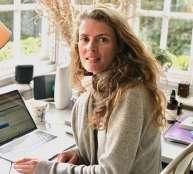
CLOCKWISE
covering sectors such as community renewables, sustainable farming, greener transport and affordable homes. More than 26,000 people are currently registered to invest and more than £120 million has been raised from the community in the past decade. These are figures Lisa is immensely proud of – but perhaps more than that, she’s proud of how they were achieved.
FUNDING TANGIBLE CHANGE
When it comes to sourcing investment opportunities to list on Ethex, the change they create is just as important as the potential for financial return. Careful checks are applied to ascertain how investment-worthy a business is, but the organisation must also demonstrate how it is creating positive change, and this will need to align with one or more of Ethex’s key investment themes.
Organisations raising finance through Ethex need to be actively taking steps to combat climate change, the breakdown of communities and/or social inequality. These are often grassroots community organisations creating global change at a local level, but equally, they can be national profit-for-good businesses that are tackling some of the biggest issues we face as a society.
LATCH AND SOLAR FOR SCHOOLS
CEO
Lisa gives the example of LATCH (Leeds Action to Create Homes), which completed two successful share offers with Ethex. LATCH was set up to address the twin problems of derelict properties around Leeds and the homelessness that affects local families; a Community Benefit Society was established to buy these properties, renovate them to a high and environmentally friendly standard and rent them at affordable rates to people at risk of homelessness.
That’s not all; LATCH provides on-the-job training opportunities for unemployed people and ongoing support services for tenants.
‘Our investors got right behind this simple but genius idea that’s solving a number of social and environmental issues’, Lisa tells us, ‘and they can see how their investment is making a difference.’
‘There is an urgent need to create change, and to make a real change, we need to find and adopt different ways of doing things.’
LISA ASHFORD MBE
CEO OF ETHEX & ENERGISE AFRICA
12 INTERNATIONAL WOMEN’S DAY mygreenpod.com
LATCH volunteer Ben Darter outside the 100th home; the Solar for Schools project has helped fund the solar roof at Hartside Primary Academy; Lisa Ashford MBE,
of Ethex, working from home
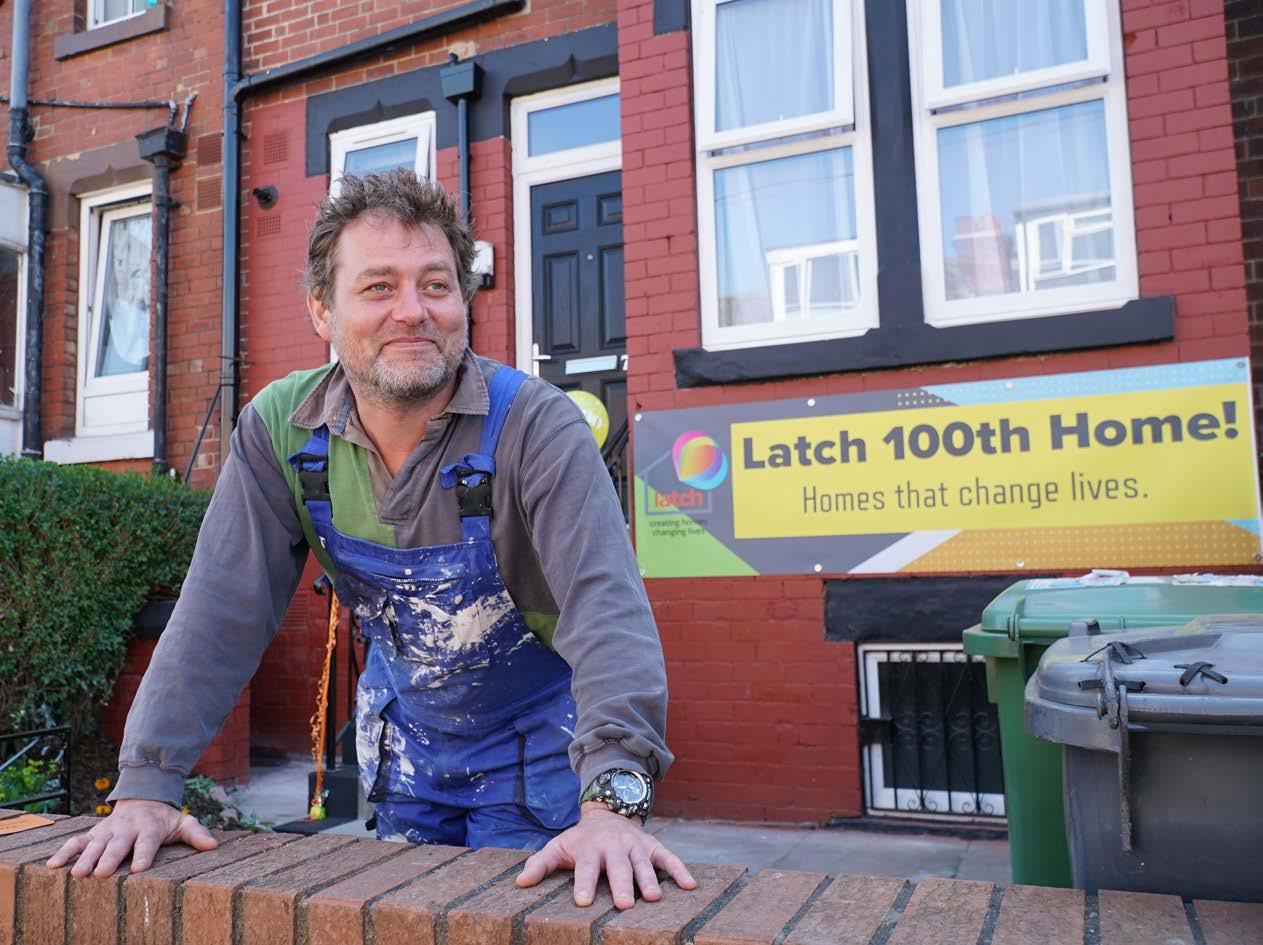
On a bigger scale, Ethex investors have supported nine bond offers from Solar for Schools, investing over £6.5 million to help put solar panels on schools across the UK. As with LATCH, the investors’ impact runs deep; Solar for Schools also provides education programmes that encourage future generations to live more sustainably, and help to create a future where we’re much more likely to reach net zero.
‘While the impact of Solar for Schools investors’ money is felt nationally, people can still see exactly what they’re funding and the difference their pounds are making’, Lisa explains. ‘And the pioneering education they’re supporting means thousands more kids will be inspired to join the fight against climate change.’
EMPOWERING A CHANGE IN THINKING
One of the biggest changes Lisa has witnessed in the investment landscape over the last 10 years is a shift in awareness among people about exactly where their money is going. ‘People were used to trusting their banks and investment providers to put their money in the best places, and they didn’t think to ask questions’, Lisa shares. ‘Now ethical options have become more widespread, everyday people are starting to think about what their savings, investments or pensions are funding, and that’s putting pressure on the big banks to stop financing harmful or unethical industries.’
For Lisa, this is one of the biggest ways in which Ethex is able to effect change. ‘As a direct impact investing platform, Ethex gives people complete transparency as to what their money is doing’, she tells us. ‘You’re choosing a specific project or business to support, so there’s no smoke and mirrors or greenwash. I think that’s a very exciting concept for investors.’
Find out more
n You can register to join Ethex’s community of positive investors who are using their money to do good at ethex.org.uk
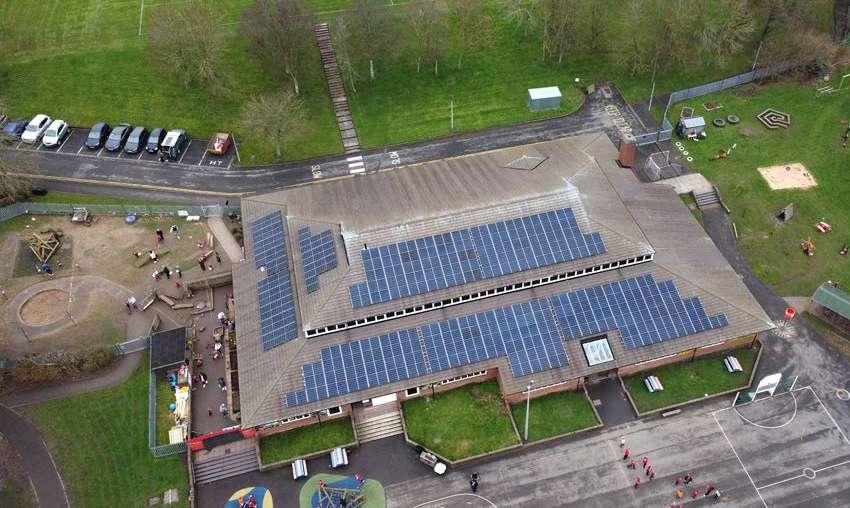
THE NEXT DECADE
The publication of Ethex’s 10 Years of Impact Report is a cause for celebration for Lisa and her small but dedicated team, and it’s driving them to keep pushing forward. ‘Our 10 year celebrations are a rallying cry from Ethex to encourage thousands of likeminded people who may not be aware of us to join us in creating a decade of even bigger impact!’, Lisa says. ‘We believe in making direct impact investing accessible to all, including more female investors, whether you have £100 or £10,000 to invest.’
Don’t invest unless you’re prepared to lose all the money you invest. This is a highrisk investment and you are unlikely to be protected if something goes wrong.
MONEY mygreenpod.com INTERNATIONAL WOMEN’S DAY 13
AHow green is your pension?
The UK’s top workplace pension providers have been ranked on their climate action
ccording to the Climate Action Report, 85% of leading UK pension providers have ‘inadequate’ or ‘poor’ climate plans in place.
The new report assesses and ranks the climate strategies of the UK’s 20 largest Defined Contribution (DC) workplace providers, which collectively manage more than £500 billion in assets and have more than 15 million active members. It was developed by sustainability research provider Profundo in partnership with green pensions campaign Make My Money Matter.
LACK OF CLIMATE LEADERSHIP
Almost all of the providers have public net zero targets, yet the ranking shows significant failings in detailed climate plans. Not one was deemed to be taking a leadership role on climate action.
Just three of the 20 – Aviva, Legal & General and Nest – were found to have ‘adequate’ plans in place. 13 providers – including household names Royal London, Prudential and Standard Life – have plans that are deemed ‘inadequate’.
The four worst-performing providers – Mercer, Hargreaves Lansdown, The People’s Pension and SEI – which manage the pensions of over 2 million UK savers, have ‘poor’ plans in place, scoring on average just one out of 10 for climate action.
‘Climate leadership is not just important for the planet – it’s popular, too’, said Richard Curtis, co-founder of Make My Money Matter. ‘But the fact that 17 of the UK’s top 20 providers have inadequate or poor climate plans tells you all you need to know about how seriously the industry is taking this issue.’
‘The public will rightly be worried about these results’, Richard continued, ‘and we hope this ranking acts as an urgent wake-up call for the pensions industry to up its game on climate change. They can help protect the planet and provide savers with pensions they can be proud of.’
RANKING PENSION PROVIDERS
The first-of-its-kind analysis from Profundo reviewed the 20 providers’ publicly available climate documentation, and assessed the extent to which each has effective objectives, policies and instruments in place to respond to climate change and drive real-world impact.
Detailed analysis was undertaken on seven core indicators of climate action: a commitment to a 1.5ºC pathway, measurement and disclosure of carbon footprint, detailed target setting, investments in climate solutions, a phase-out of fossil fuels, deforestation and land use and portfolio stewardship instruments.
Providers were scored against criteria for each using internationally recognised standards.
MAKE AN INFORMED CHOICE
Across the board, results run counter to public claims of climate leadership. While this ranking shows most have set broad climate targets, the majority are failing in the substance, detail and implementation of these plans. On two critical areas of climate action, progress is woefully inadequate: on policies related to coal, oil and gas, eight out of the 20 scored 0/10. On deforestation
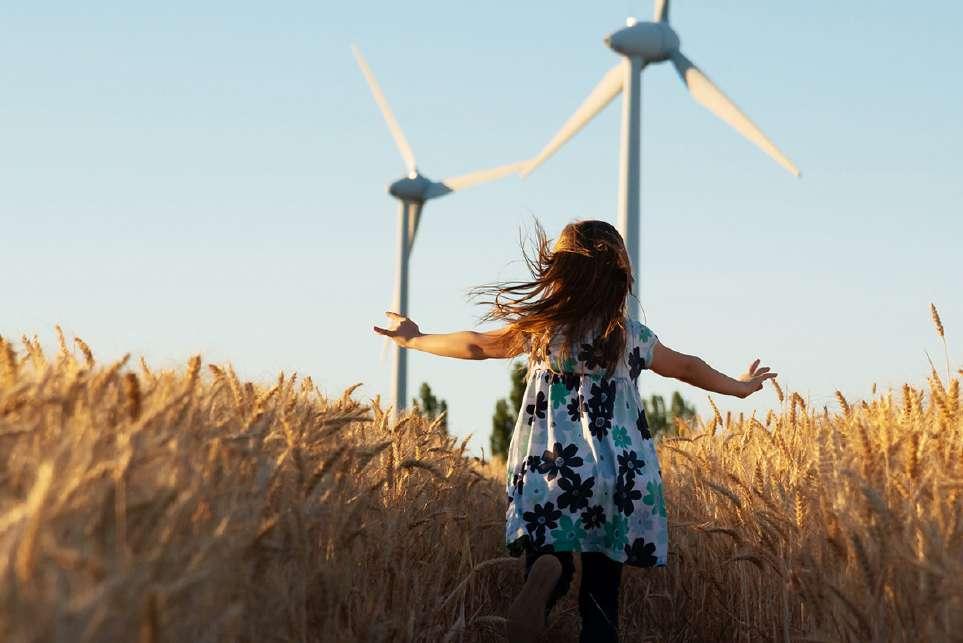
and land use, all 20 were found to have poor or inadequate plans.
On average, providers scored just 3.2/10. This shows that despite pockets of progress, the majority are failing to implement ambitious, science-based climate plans.
Further inadequate action risks alienating pension holders who expect leadership from their provider and threatens long-term financial returns as schemes fail to sufficiently address climate risk.
While the ranking does not constitute financial advice, Make My Money Matter hopes it will help savers and employers make more informed and environmentally conscious decisions on their pensions and encourage the UK’s largest providers to ramp up climate action in 2024.
Specifically, Make My Money Matter is calling on all providers to end finance for fossil fuel expansion, tackle deforestation in their portfolios and urgently scale up investments in climate solutions.
MONEY
Find out more n For information about the pensions and ratings, have a look at makemymoneymatter.co.uk/pensions 14 INTERNATIONAL WOMEN’S DAY mygreenpod.com
PHOTOGRAPHY ISTOCK Aviva 5.4 Legal & General 5.3 Next 5.1 Cushon 4.6 Scottish Widows 4.6 Fidelity International 4.5 Smart 3.8 Standard Life 3.7 Aegon 3.3 Royal London 3.1 Prudential 3.0 TPT 2.9 Now 2.6 Aon 2.5 Lifesight 2.5 National Pension Trust 2.5 Mercer 1.6 Hargreaves Landsdown 1.1 The People’s Pension 0.9 SEI 0.5
PERFORMANCE Overall score /10
CLIMATE
HERO PRODUCTS
Introducing our March Heroes!
We’ve picked these products because we believe they are all best in their class for people and the planet. They represent simple, sustainable switches that will help to keep you, your home and the planet healthy –without compromising on performance!
View all our Heroes at mygreenpod.com/heroes

A micro batch of mezcal – a sustainable spirit supporting biodiversity and local culture. mygreenpod.com/heroes/ sin-gusano-cucharillo-con-espadin
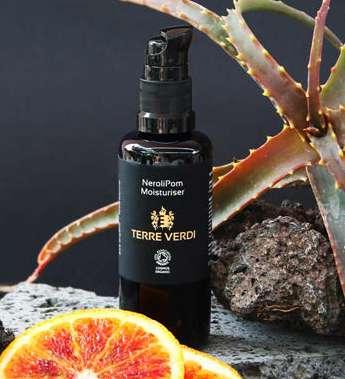
The UK’s first water-based face moisturiser to achieve COSMOS Organic certification.
mygreenpod.com/heroes/ terre-verdi-nerolipom-moisturiser
FOOD & DRINK
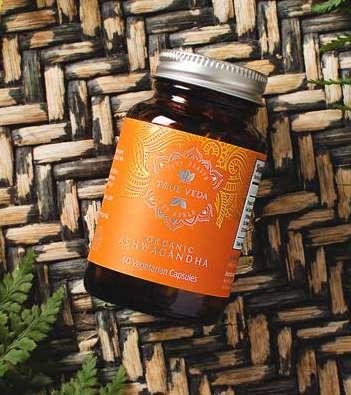
A multi-award winning supplement known as Withania somnifera, or Indian ginseng. mygreenpod.com/heroes/ true-veda-organic-ashwagandha
HEALTH & BEAUTY
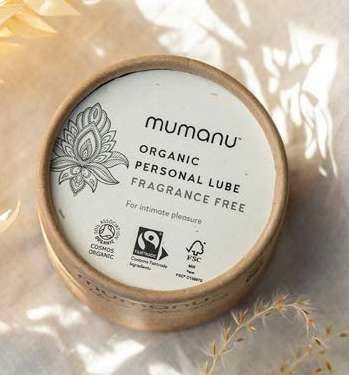
MUMANU
ORGANIC PERSONAL LUBE
A certified-organic lube, with a super-smooth gliding, silky and intimate sensation.
mygreenpod.com/heroes/ mumanu-organic-personal-lube
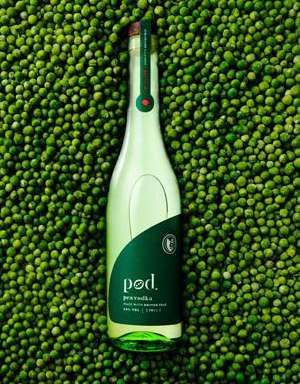
A fresh, flavourful and climatepositive vodka – made with 100% British peas! mygreenpod.com/heroes/ pod-pea-vodka

GINGINGERS
APPLE CIDER VINEGAR GEL
Multipurpose gel, with apple cider vinegar plus nature’s treasures to tone, balance and more.
mygreenpod.com/heroes/ gingingers-apple-cider-vinegar-gel
TOP 5 MARCH SWITCHES
1
Switch to the first and only UK-made 100% biodegradable polyester pillow! The vegan and hypoallergenic Biosnooze feels like down, but without a single feather in sight.
#Biosnooze mygreenpod.com/heroes/ biosnooze-pillow
2
Stuck for gift inspiration?
Now you can mark any special occasion with the gift of a tree, complete with a wooden decoration from 9Trees CIC. @9treesUK
mygreenpod.com/heroes/ 9trees-tree-gift
3
Worried about the impact of your banks, pensions or bills? Calculate the carbon footprint of your money and switch to a greener solution using the MotherTree switching service. @MotherTreeLtd mygreenpod.com/heroes/ mothertree-switching-service
4
Go natural this spring –Haoma Organic Eau de Parfum is a sophisticated and pure perfume made with 8 organic essential oils –and no synthetic fragrances. @Haoma_UK mygreenpod.com/heroes/ haoma-organic-eaude-parfum-no-1
5
Arbikie Highland Rye Single Grain Scotch Whisky –the first rye Scotch for over 100 years – revives an authentic way of distilling. @Arbikie mygreenpod.com/heroes/ arbikie-highland-rye-singlegrain-scotch-whisky
TRUE VEDA ORGANIC ASHWAGANDHA
POD PEA VODKA
SIN GUSANO CUCHARILLO CON ESPADÍN
TERRE VERDI
NEROLIPOM MOISTURISER
mygreenpod.com INTERNATIONAL WOMEN’S DAY 15
Women in POWER
The energy sector lags behind when it comes to diversity – this is why it matters
Energy has a crucial role to play in the transition to a flourishing and equitable society – but we’ll struggle to get fair and just outcomes from a sector that lacks diversity.
Fran Woodward, COO at Good Energy, is part of a generation of women she feels ‘had it much easier than our mothers did at work’, but for whom workplaces have still been tough. ‘I put off having children until my mid-30s, probably in part because of the impact it would likely have on my career’, Fran tells us. ‘And indeed it did.’
Fran was operating at a director level when she left work to have kids; part-time roles – or even positions for four days a week – were then extremely rare at this level. ‘Huge numbers of talented women disappeared from the workforce or from the progression paths that would have allowed them to access senior roles in industry today’, she says.
It’s a familiar story with no straightforward solution; Fran’s approach was to work three to four days a week as a freelance consultant and interim in order to maintain a level of professional experience.
‘Good Energy then offered me a director-level role on four days a week’, she tells us; ‘after a relatively short space of time I went back to five days a week, but it was my choice and I was not forced.’
WOMEN IN THE ENERGY SECTOR
Within the energy sector, Good Energy’s approach to supporting and encouraging women in the workplace was pretty unusual; when Fran moved into the industry after positions in retail, FMCG and publishing she felt the sector stood out for being more male-dominated.
According to the International Energy Agency (IEA), globally the gender gap in energy is more than twice as large as it is in the non-energy sector – and the stats show that it is especially imbalanced at a leadership level.
‘POWERful Women, the UK campaign for gender balance and diversity in the sector, researches this regularly’, Fran tells us. ‘Its most recent review reveals that women occupy 29% of board seats while the FTSE 250 reached 36.8% women on boards in 2022, so the energy sector is behind. The former figure is up marginally from 27% in 2021, which suggests it is at least moving slowly in the right direction.’
But the figures don’t always reflect how things feel and look on the ground; ‘It often feels as though it is going the opposite way’, Fran says. ‘Juliet Davenport stepped down as Good Energy’s CEO in 2021 and So Energy’s female CEO Monica Collings followed last November, meaning the
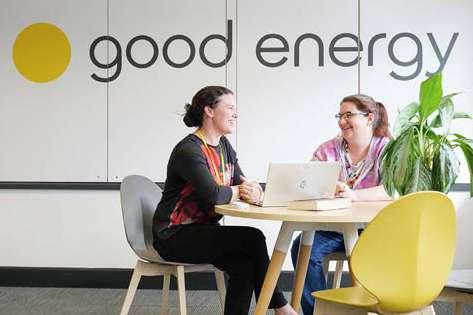
UK currently has no energy supply companies with a female CEO.’
A long history and roots in engineering and infrastructure have played into the male dominance, and many of the roles in energy today require science, technology, engineering and mathematics (STEM) qualifications. There have been challenges getting girls and young women to study these subjects at school and university, which is one reason why jobs that require these skills – in areas like technology, finance and engineering and trading – lack female applicants.
Yet this isn’t the end of the story; while gender imbalance tends to be more pronounced in STEM roles, there is more going on. ‘Sometimes I think there is a danger we all hide behind the need for ‘STEM’ subjects’, Fran accepts. ‘An energy company has a huge variety of roles and needs breadth of skills – particularly those that help it understand and serve its customers, employees and other stakeholders. It is as much about people as it is about tech, engineering and finances.’
Fran stresses that intelligent people who learn fast, from all backgrounds and walks of life, can learn if they are given the right opportunities. For that reason not all CEOs of energy firms today have science, technology, engineering or accounting backgrounds. ‘A couple of examples I know of, as I have worked for them both, are our CEO Nigel, who studied history at university and has not had a ‘STEM’ career’, Fran reveals, ‘and E-ON UK’s Chris Norbury, another arts graduate, who has an HR background. So a STEM education is not the only reason there are so few women in the top jobs.’
EMBRACING NEW WORK STYLES
For Fran, one of the things deterring women from roles in the energy sector is the lack of women; ‘That’s why those of us in the sector need to get out there and be seen!’, Fran says. ‘When you look at an industry and do not see anyone else like
yourself, and a lack of representation in leadership roles, that is going to put you off. As a woman you would be forgiven for assuming your opportunity for progression is going to be limited.’
The good news is that things are changing rapidly, supported by campaigns and initiatives to get more women into energy roles. ‘Here in the UK we have POWERful Women and our industrywide trade body Energy UK — which itself has a great female CEO in Emma Pinchbeck — runs a programme called TIDE, or Tackling Inclusion and Diversity in Energy’, Fran tells us. ‘The IEA set up its Gender Advisory Council in 2021.’
The trend towards flexible working styles has also been particularly beneficial for women, who are more often caregivers. The global shift was already well underway, driven by the need to hire and retain good talent. It was then supercharged by the challenges of lockdown. ‘In a post-Covid world flexible and remote working is the norm’, Fran says, ‘which has helped to level the playing field.’
For Good Energy new work styles have helped to improve diversity in other ways; ‘Our corner of the South West is not the most ethnically diverse’, Fran accepts, ‘but with remote and hybrid working we can cast a much wider net.’
DIVERSITY MATTERS
Diversion and inclusion are important from a social justice perspective, but why do they matter so much from a business point of view? ‘The most obvious answer is that you need the best people in any given job’, Fran says. ‘If there are systemic barriers to women getting that job, that means that having the best person is less likely. That is not reverse discrimination, it is equity – a level playing field. In addition to this if there is a majority of people with similar backgrounds and viewpoints, due to a lack of balance in gender, ethnicity, socioeconomic background or neurodiversity, that can lead to groupthink. Problems or solutions others may see don’t get seen.’
For Fran it’s important to note that working policies which can lead to gender balance should not – and do not – solely benefit women. ‘I believe until it is as acceptable for men to have flexible working in the workplace, as it is for women, equity will be hard to achieve’, she explains. ‘We have had several senior men in Good Energy take up shared parental leave and part-time working, and make every effort to celebrate how fantastic this is. We have to shift the old norms around women being primary carers and lift the stigma men often still get when they play an active role.’
16 INTERNATIONAL WOMEN’S DAY mygreenpod.com
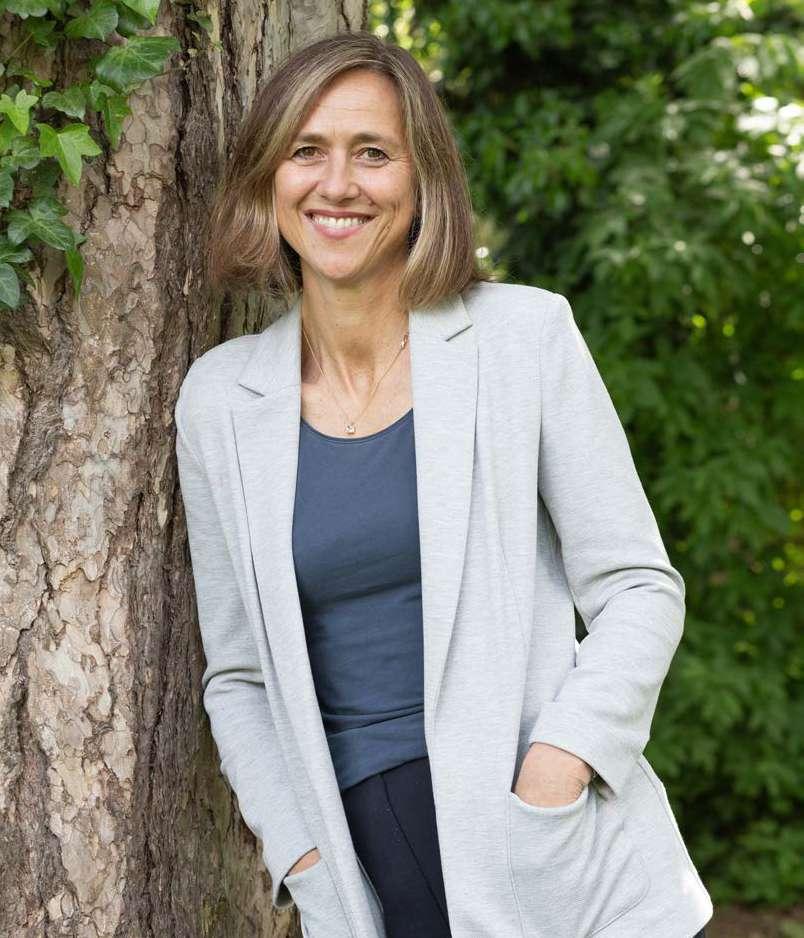
While balance and representation are key to success in any sector, Fran sees even more reason to encourage diversity in the energy sector. ‘In energy we have an incredibly important mission to decarbonise and tackle climate change’, she tells us. ‘If you consider that a lack of gender balance could lead to groupthink, this becomes extremely worrying. We need the best possible people, with diverse perspectives, to drive what is a huge transformation of mindsets, systems and behaviours. Groupthink poses a risk to this. We need it to be just, fair and to bring everyone along – and that means gender equity.’
CREATING A DIVERSE CULTURE
Thankfully, the renewable energy sector that we require for rapid decarbonisation is slightly ahead of the game when it comes to embracing diversity.
According to the IEA, women account for 22% of the global labour force in the oil and gas sector and 32% when it comes to renewables. So while there is imbalance across the board in the energy sector, it is less pronounced in renewables. ‘I expect this is largely down to companies in the renewables sector tending to be more recently founded and therefore more progressive and forward-thinking’, Fran suggests. ‘It offers some hope that the companies at the forefront of the energy transition are more inclusive and have more diverse talent.’
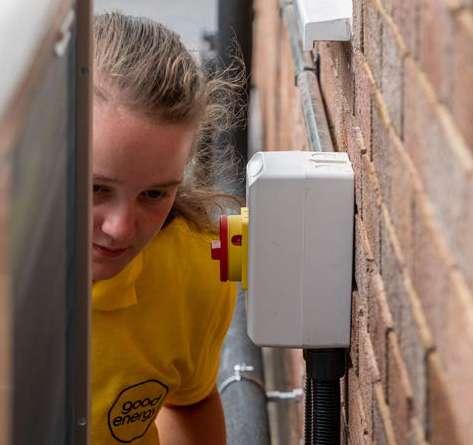
Since joining Good Energy Fran has been given great scope for progression, and feels the culture took its lead from former CEO Juliet Davenport. ‘Juliet had an infectious ‘can-do’ attitude’, Fran says. ‘She was a self-taught CEO who was great at giving others, like me, the chance to take on new things without the barrier of direct previous experience.’ The current CEO, Nigel Pocklington, supported Fran joining the board as an executive director. ‘But while I have progressed, overall gender balance at the top of the industry is still a problem’, she says. There are some obvious ways to attract more women to the energy sector, like ensuring women
are shortlisted for roles, and those are effective to a degree. But there are deeper issues at play.
‘A couple of impactful schemes we run have helped address the fact that women are often less confident in their own abilities’, Fran tells us. ‘This can affect everything from their willingness to apply for promotions to their ability to communicate.’
Good Energy’s Early Careers programme helps its talent learn about the different jobs across Good Energy, and gives staff the chance to ‘test’ different roles. ‘This seems to particularly help those people with confidence issues’, Fran says. ‘We also run 121 coaching for our mid- to senior-level managers; the women take this up 50% more frequently than men, and we see significant shifts in their performance and ability to show their potential as a result.’
Good Energy has worked with organisations like STEMettes, a brilliant charity set up to inspire and encourage girls and young women into STEM, and try and encourage a better pipeline of female talent from an earlier age. ‘We must also recognise that there are plenty of careers in energy that do not require a STEM background’, Fran says. ‘I have a degree in English and my career has been in customer and people functions.’
A SECTOR FIT FOR THE FUTURE
Fran would like to see people selected for roles based on skills and capabilities, not just past experience. ‘We should select people who learn and adapt fast over those who know how to do it because they have done it before’, she says. ‘If you test for these skills fairly, then you are hiring the best person for the job – even if they do need slightly more ‘getting up to speed’ time in the short term. This will help you accelerate talented people from more diverse pools, including women.’
Wherever possible, Fran would like to see flexible and remote working practices rolled out to everyone. ‘Recognising men’s adoption of flexibility, and an equal role in caring for dependents, is key. We should showcase senior men working flexibly so it’s seen not just as being socially acceptable but also a sign of success. This goes hand in hand with investment in good maternity, paternity and shared parental leave schemes.’
Now Good Energy faces a new challenge, as it recently became a heat pump and solar installer that employs engineers and electricians. ‘You can’t work from home if your job is fitting a hot water tank or a solar inverter’, Fran acknowledges. ‘And as you might expect, the people in those roles are overwhelmingly male.’
There are roughly 3,000 qualified heat pump engineers, and we’ll need about 50,000 to hit the government’s heat pump targets. ‘I don’t think our government is doing enough to encourage young people into these fantastic careers’, Fran says. ‘This goes for boys, too, if you look at diversity through a socioeconomic lens.’ Thankfully the companies powering us towards a sustainable future are now pushing for change in the diversity stakes, too.
ENERGY mygreenpod.com INTERNATIONAL WOMEN’S DAY 17
n Discover more about what makes Good Energy different at goodenergy.co.uk
CLOCKWISE Good Energy COO Fran Woodward; Good Energy wants to attract more women to roles in the energy sector; inside Good Energy HQ
Find out more
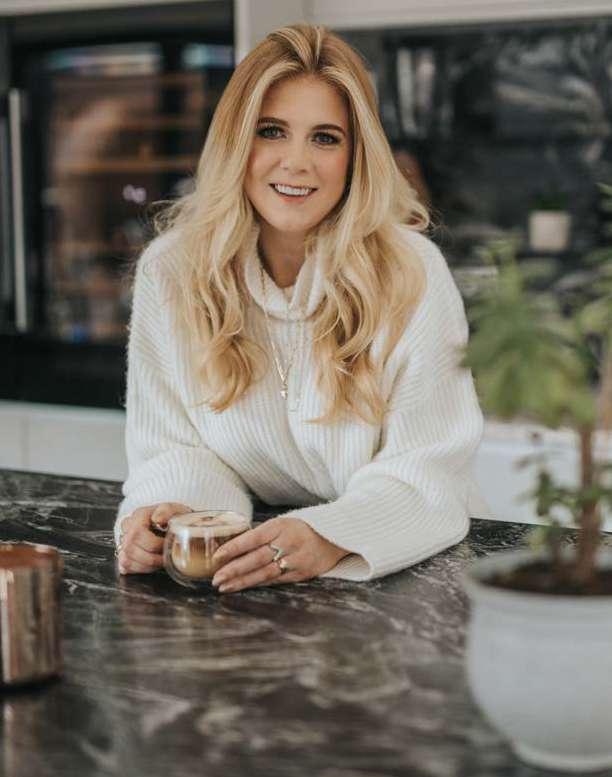
Alongside solar PV, 2023 was also another record-breaking year for heat pump installations. We saw a significant rise in adoption in 2023, propelled in part by the UK government’s £7,500 grant to encourage its target of 600,000 heat pump installations per year by 2028.
As the popularity of both microgeneration tech and energy-efficient heating rises, so too does demand for smart tech that synchronises the devices that generate, store and use electricity.
HEAT YOUR HOME THE SMART WAY
Our power diverter, eddi, is proving hugely popular with homeowners for linking solar arrays and heat pumps. When solar PV is generating low volumes, eddi will automatically ‘trickle charge’ a heat pump or water heater; once panels reach a higher load, eddi will divert full power to the appliance, reducing reliance on the grid.
YOU'VE GOT THE POWER
Jordan Brompton, co-founder of myenergi, reveals how to slash bills and emissions by turning your home into a virtual power plant
At COP28, world leaders agreed to triple renewable capacity and double energy efficiency by 2030.
The first target, according to energy thinktank Ember, is not only achievable but also perfectly possible – provided the world increases its renewables deployment by 17% each year (from 500GW in 2023 to 1.5TW in 2030).
While supply to the grid will take up a significant proportion of this targeted extra renewable energy capacity, another important factor is the rise of domestic electricity generation.
Self-generated wattage literally puts the power in the hands of the consumer, allowing adopters to take control of their own energy generation and consumption while heavily reducing grid reliance and unlocking additional capacity.
HERE COMES THE SUN
Generating renewable energy via solar is increasingly being seen as a simple and costeffective way to reduce reliance on the grid, decentralise electricity supply, cut utility bills and protect against energy market volatility. In fact, over the past few years the adoption of solar has accelerated at incredible speed.
According to data from the Microgeneration Certification Scheme there was a boom in installations last year, with a 62% jump in new installs compared with 2022.
The prospect of slashing energy bills and lowering carbon emissions certainly makes self-generated green energy attractive. However,
the great disadvantage of any microgeneration tech is that it can be unpredictable and ‘lumpy’. Optimum generation is reliant on certain weather conditions, and peak generation periods are during the day when most users are likely to be away from the home at work.
As a result, the average consumption rate for self-generated power stands at just 45% in the UK, with some users reducing their reliance on mains energy by less than 25%. Rather than making full use of self-generated solar energy in the home, electricity is exported to the grid at times of high generation and low use, and then typically bought back (at a higher price) when it’s needed most.
MORE POWER TO YOU
We founded myenergi to help households take complete control of their self-generated renewable energy using our eco-smart devices. Take zappi, for example – the world’s first solar-compatible electric vehicle (EV) charger. It can harness 100% renewable energy from microgeneration tech such as solar and charge your EV at zero cost.
HOME IS WHERE THE HEAT IS
But what about one of the most energy-intensive –yet crucial – functions of your home: heating? We're increasingly switching traditional gas boilers for greener and more efficient heat pumps.
Eddi can even be configured to send energy to up to two heating appliances in sequence, automatically switching between devices for greatest efficiency. By making intelligent decisions every second, eddi helps homeowners maximise the value of self-generated renewables.
At times when more energy is generated than required, myenergi’s domestic storage battery, libbi, captures this surplus electricity for discharge as and when needed.
With the introduction of VAT cuts to energy storage and power diverters in the UK from February this year, we’re expecting the popularity of devices like eddi to soar.
VIRTUAL POWER PLANTS
While most microgeneration, power diversion tech and storage can work autonomously, myenergi products can also work as part of a connected ecosystem. Users with a suite of products can choose how to generate electricity plus where and when to use it – whether to heat the home, charge an EV, store for later or anything between.
As we move towards a more decentralised, decarbonised and distributed energy system, environmentally and cost-conscious consumers will play an increasingly vital role as they take further control of their energy generation and use.
Eco-smart devices will quickly become valuable energy assets, and British homes will become small-scale virtual power plants offering crucial, flexible grid support – significantly raising energy security while simultaneously lowering emissions.
Find out more
n Information about myenergi’s smart tech appliances and installation is at myenergi.com

ENERGY
18 INTERNATIONAL WOMEN'S DAY mygreenpod.com
Find out why myenergi is a My Green Pod Hero at mygreenpod.com
We don’t always think about the impacts of our built environment, yet decisions we make when creating living and working spaces can affect animals, people and the planet.
According to Mykor, a startup launched by Royal College of Art graduate Valentina Dipietro, the global construction industry contributes to 50% of all climate change, 40% of drinking water pollution, 23% of air pollution and 50% of landfill.
In creating and furnishing spaces we use a huge palette of virgin materials – fibres, petrochemicals, forests, minerals, metals and more – yet as an industry, interior design is not always looking at the whole picture. Designers can unwittingly contribute to environmental damage through the supply chains and lifecycles of the products they use.
As designers we want to please our clients and work fast to deliver; meanwhile we’re encouraging consumption and using fossil fuels, toxic chemicals and natural resources. We’re disconnected from nature. Our industry pollutes our air, land and water – and that pollution then finds its way into our bodies. We are also disconnected from our supply chains, which can exploit people – even children and also animals, who are still seen as commodities and resources for our needs.
DESIGNING POSITIVE CHANGE
I really want to help my industry to slow down and work consciously, so when I was commissioned to write Sustainable Interior Design for RIBA Publishing, I leapt at the opportunity to support positive change in the sector.
My own approach to interior design has centred on my passions: the circular economy and vegan design. These interests stem from the great learning experience I received at the headquarters of Anita’s Roddick’s The Body Shop, where I worked as a retail designer soon after graduating in the 1990s.
Anita used her shops as a vehicle to campaign on inequality and injustice – and even to get the law on animal testing changed. Her approach pushed the boundaries of retail, and showed us that business can do so much more than sell products.
LIVING IN HARMONY WITH NATURE
In Sustainable Interior Design I define 11 approaches that encourage positive change and bring us closer to harmony with our beautiful planet. Along the way I have found some very exciting and special examples of how this can be done beautifully and luxuriously.
One of the most expensive furniture investments we make is a kitchen, yet according to Rehome, the kitchen, bedroom and bathroom outlet, in the UK one in four is replaced within just four years.
One of the many clever designs included in the book is a kitchen you can take with you when you move house. Spanish architect Paula Rosales of Kitchen For Life has designed a kitchen system that can be disassembled and reassembled using durable non-toxic materials, which can easily be added to and repaired.
SHARING AND COLLABORATION
I’ve also found some great examples of how to use
Sustainable Interior Design
Interior designer Chloe Bullock shares how she hopes to inspire positive change in the sector
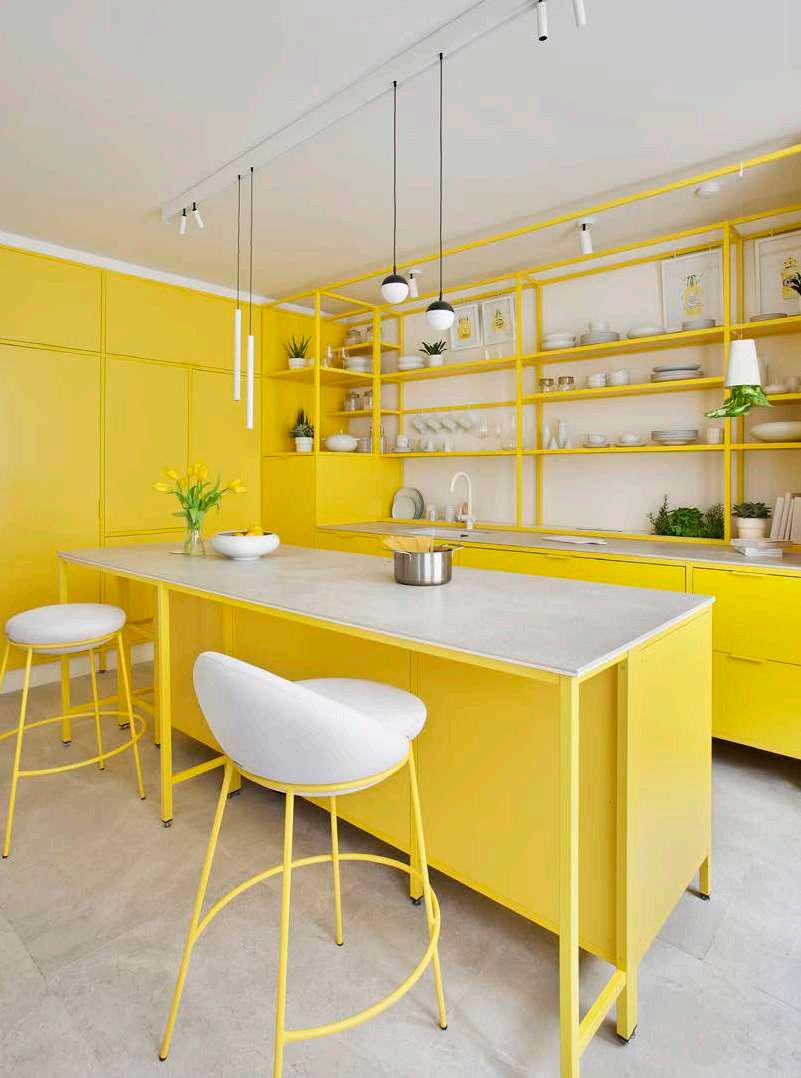
the sharing economy for interior fit-outs. In Brooklyn, Whitney Falk has created ZZ Driggs, a lending library of beautiful crafted furniture combined with curated vintage finds that can be borrowed when you need them.
In India I found Tipai, a wonderful resort where designer Ariane Thakore Ginwala has helped to ABOVE
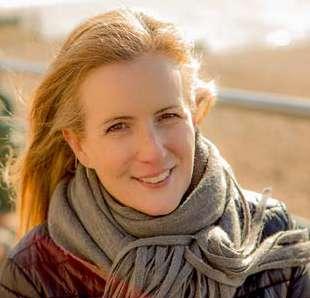
design more mindful
revive crafts and skills for the surrounding community, while regenerating land that had been depleted by years of teak farming.
The book also takes a tour of designer Deborah Di Mare’s Miami home to reveal how easy – and beautiful – it can be to avoid animal-derived products.
I was lucky to be able to work with Elena Branch, the perfect illustrator and partner for the book. This is her first book commission and her illustrations feature throughout the book and on the cover.
I’ve loved showcasing the exciting work happening in my industry globally. This book is very close to my heart, and I really hope you enjoy it.
Find out more
n Sustainable Interior Design by Chloe Bullock will be available from RIBA Bookshop from 05 April 2024. Pre-order your copy at ribabooks.com/ Sustainable-Interior-Design_9781914124990#
mygreenpod.com
HOME & GARDEN
Paula Rosales' reusable KITCHEN FOR LIFE kitchen design
LEFT
Chloe Bullock is on a mission to make
INTERNATIONAL WOMEN'S DAY 19
PHOTOGRAPHY
NACHO URIBESALAZAR, CASA DÉCOR 2021
Organic grooming
Could your pet’s shampoo be affecting their behaviour?
Many of us are paying closer attention to the ingredients in the products we use to wash our hair and skin. We don’t want toxins in direct contact with our bodies, and we don’t like the idea of washing a cocktail of nasty chemicals down the drain and into our waterways every time we take a bath or shower.
While we’re starting to wake up to the dangers of dirty personal care routines, we don’t always give the same consideration to the products we use on our pets – and when we do it’s not at all easy to find the products we want.
‘There are only a couple of certified organic pet care products across the globe’, say Jacquie Walby, founder of The Conscious Way. ‘We can only assume that the remainder are based on conventional formulations that use some or all of the dirty chemicals and microplastics that damage skin and hair, and pollute our waterways and therefore our soils.’
MAKING CONNECTIONS
During a business assignment for her freelance role in health services, Jacquie gained an insight into the organic cosmetics market. ‘I realised two things’, she tells us. ‘First, all organic cosmetics, health and beauty products command a huge premium; second, I could not find anything certified organic for my precious dogs and horses. I did not find either of these things acceptable.’
During extensive research, Jacquie discovered pets were increasingly suffering from skin complaints. ‘One lady had been through every medicated shampoo she could find, plus others promising relief from skin problems’, Jacquie says. ‘Nothing worked – in fact she reported that some even made her old dog’s skin problems worse.’
Jacquie was already aware of the potential impact of chemicals on wildlife. When she and her husband took on a 140-acre farm in a rural area on the edge of the Cotswolds, she was astonished to notice there were no birds. The land had been growing arable crops, conventionally and intensively, for many years.
The decision was made to convert to organic farming, and 25 years later the land is alive with insects which attract redwing, fieldfares, starlings, pigeons, crows, swallows and seagulls.
It didn’t take Jacquie long to make the connection between pet health and the products their owners were using. ‘Without the harsh chemicals and detergents in pet care products, I honestly believe we would see far fewer skin problems and also behavioural issues in animals’, Jacquie tells us. ‘As all mammals absorb 60% of whatever is put on their skin into their bodies, all the chemicals must be contributing to health and wellbeing issues.

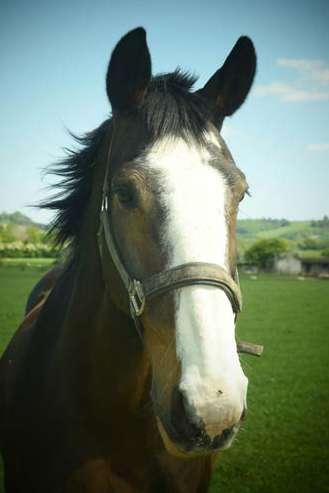

Research in humans is revealing the importance of the microbiome and the positive impact of an organic diet.’
ORGANIC CERTIFICATION
Jacquie set out to create her own versions of the products she wanted to use on her own pets – and The Conscious Way was born. The range comprises a dog wash, equine shampoo and paw balm – all vegan, certified organic by the Soil Association and packaged in recycled and recyclable plastic bottles.
‘What a lot of people don’t realise is that ingredients used in grooming products can be described as natural when in fact they are highly processed and not permitted in certified organic products’, Jacquie explains. ‘I am sure we all wished that we lived in a world where we could be confident that we were being told the truth. Sadly, that is not the case – particularly when it comes to marketing to the public. We wanted to do the right thing by producing organic grooming products, but we did not think we should expect the public to take our word for it.’
Organic certification from the Soil Association guarantees a product contains the levels of organic and natural ingredients stated on the label, and also that it will not contain synthetic ingredients dressed up as natural.
These shampoos are used just like any other; they lather well but rinse out really easily. ‘I think this is the thing that most users find surprising’ Jacquie shares; ‘it is because our products don’t contain detergents.’
In contrast the paw balm – a new addition to the range – is different from other balms on the market in that it’s a spray-on liquid. It comes in a pocket-sized 100ml bottle and is very easy to use, without leaving any messy residue on your hands.
COSTS AND SAVINGS
Jacquie started trialling the shampoos over a year ago and has found – with her own animals as well as her customers’ – that hair becomes increasingly soft and silky over time. It also seems to repel dirt, meaning it doesn’t need washing as frequently.
So far so good – but with financial worries still on many people’s minds, is it realistic to expect pet owners to pay a premium for organic shampoos?
‘We recognised before we began this journey that if organic products come with a price premium, nothing will change’, Jacquie acknowledges. ‘We have cut margins and are keeping overheads to a minimum in order to place this product at a competitive price. It’s actually cheaper than some conventional products.’
Jacquie has got lots of ideas for new products –a fly repellent shampoo for horses will be available this spring and others are set to launch later in the year. ‘Now we need to spread the word and persuade more people to try organic’, Jacquie says. ‘That is what The Conscious Way is all about.’
HOME & GARDEN
20 INTERNATIONAL WOMEN’S DAY mygreenpod.com
Find out why The Conscious Way is a My Green Pod Hero at mygreenpod.com
FROM
THE TOP The Conscious Way Pet Dog Wash is uniquely certified organic by the Soil Association; the organic Equine Shampoo helps to calm and soothe all breeds of pony and horse; organic puts health and wellbeing first
Ten Locks Drinks was launched in 2020 to satisfy what its director, Becky Davies, describes as an ‘insatiable need’ in the UK for authentic, interesting and premium spirits. The company imports and distributes premium drinks from companies striving for positive change – including B Corps, organisations led by women or owned by co-ops or simply underwritten with a philanthropic intention.
‘I feel it should be easy for people to buy and consume sustainably and ethically’, Becky tells us. ‘There is a growing appetite for these products and I want to encourage both producers and stockists to be more proactive in this space.’
A MAN'S WORLD?
For Becky, having a diverse team is incredibly important, and she intentionally surrounds herself with people who have different skills. ‘Throughout my career, I have often found myself the youngest and the only female in a room’, she shares. ‘If anything it spurs me on – and I also see real value in what others can bring to the table, particularly in business.’
This may be a male-dominated industry but Becky has noticed that having a balanced team, with over 50% women, has changed the dynamic at Ten Locks for the better. ‘Women rock!’, she tells us. ‘They have something different to offer that can add value to any business. If you haven’t recognised this then your business will be left behind.’
POSITIVE DRINKS
The current economic climate is presenting ongoing challenges for businesses across the board – and the drinks sector is no different. Rising operational costs, reduced disposable incomes and post-Brexit difficulties with imports and recruitment are compounding the broader challenge of a shrinking market; 39% of young people aged 18-25 are non-drinkers and many more, of all ages, are opting to moderate.
Becky supports the movement towards moderation and quality over quantity, and sees Ten Locks as a support for the hospitality industry as it is forced to react and respond to shifting social cultures.
‘We can support bars and restaurants by offering appealing cocktails and drinks’, Becky explains. ‘We’re currently seeing that when people do drink they choose better, which is great for premium spirits. Our brands provide an interesting point of difference and help to create the kind of experience bars and consumers are seeking. One example of this is the brand Three Spirit, a range of functional, non-alcoholic spirits which never fail to pique consumers’ interest.’
In addition to Three Spirit, the Ten Locks portfolio includes a wide range of products including ‘Mexico’s best-kept secret’, El Tequileño; co-op owned Banhez mezcal and the beautiful Savoia aperitivo, made by industry-renowned Giuseppe Gallo.
BETTER BUSINESS
Becky’s experience in the drinks industry has convinced her of a need for more open conversations about what is and isn’t working in the sector.
‘It’s difficult to create a brand to excite the industry and ensure it is sustainable and affordable’, she acknowledges. ‘I had to learn this the hard way with Pod Pea Vodka.' This Ten Locks vodka is made using an extremely sustainable raw material (peas), transition glass and zero plastic, and ingredients are sourced as locally as possible. 'My cost of goods ended up being double
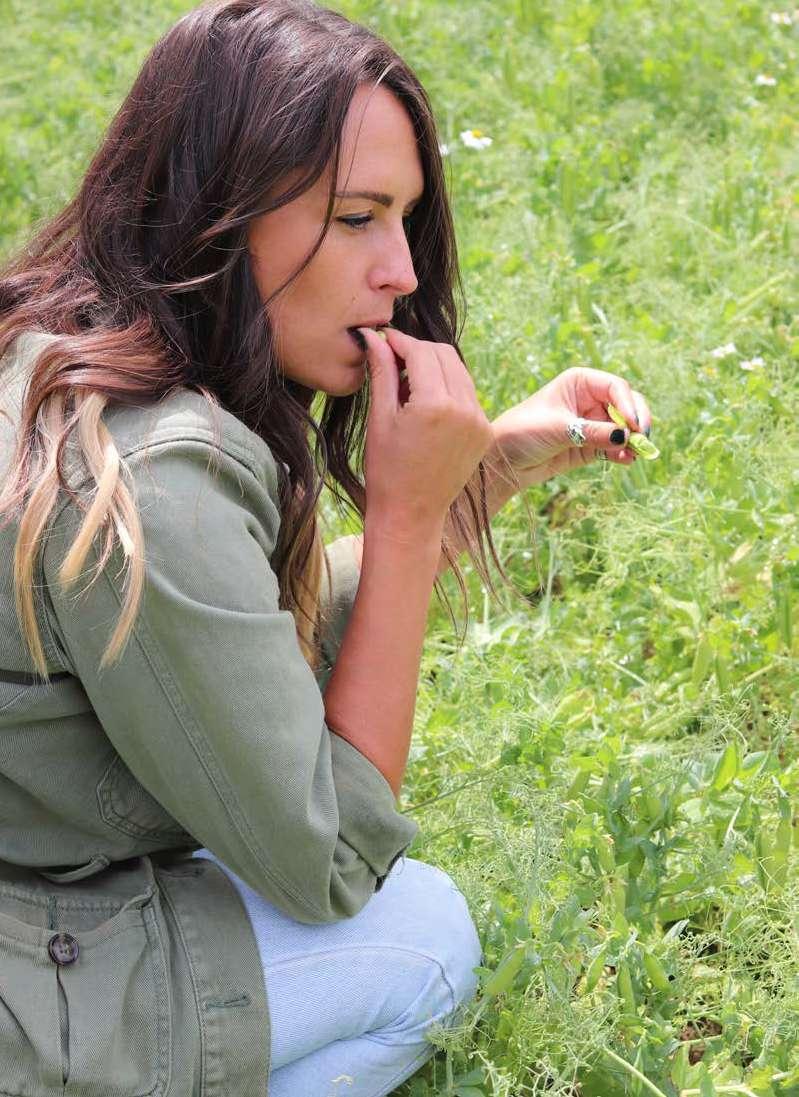
In a male-dominated drinks industry, women can bring a new perspective and a refreshing approach to business
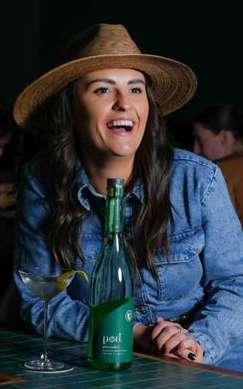
what I anticipated because I opted for sustainable ingredients and materials', Becky tells us. 'This, in turn, makes our price point inaccessible for many, which wasn’t the intention and something that I continue to explore, because I believe sustainable products should be accessible and affordable.’
Despite all efforts, Becky acknowledges that Pod isn't necessarily the most sustainable brand on the planet. ‘There is always work to be done and it’s important to keep identifying where we can improve’, she says.
Along the way, Becky tries to do everything with integrity and respect – for people and the broader environment. ‘I’ve been in many situations where these two key values are disregarded for profit or status’, she says. ‘Times have changed and I stand for a better way of doing business – with integrity.’
FOOD & DRINK
POSITIVE
Find out more n Discover drinks from companies striving for positive change at ten-locks.com mygreenpod.com INTERNATIONAL WOMEN'S DAY 21 Find out why Pod
is a My Green Pod Hero at mygreenpod.com
DRINKS
Pea Vodka
and
the drinks sector
Becky
Davies is championing diversity
sustainability in
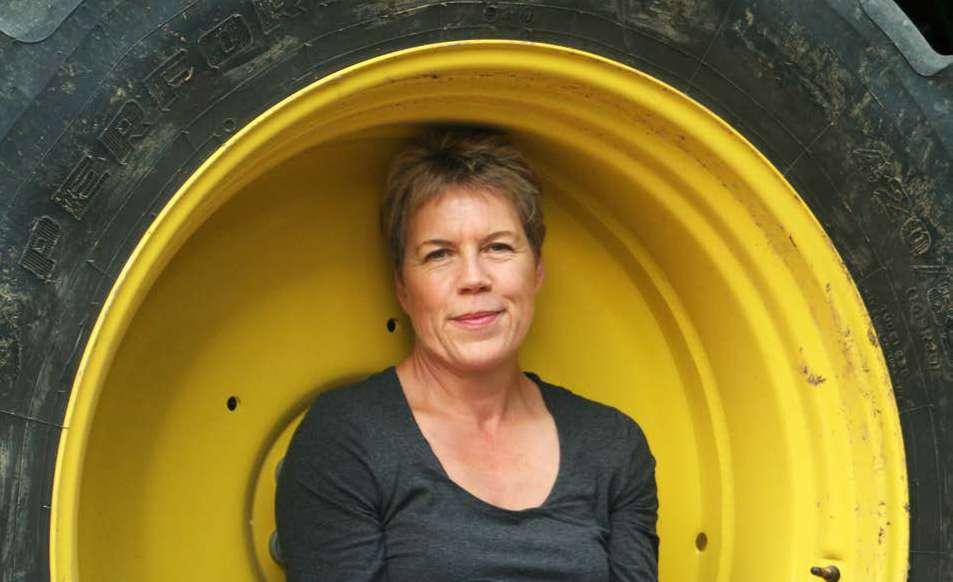
Women in farming
Soil Association’s Helen Browning explores how diversity in farming can support solutions for climate, nature and health
According to the Office for National Statistics (ONS), the number of women employed in farming, forestry and fishing has fallen from a peak of 215,000 in 2015 to 68,000 today.
This feels counter-intuitive to me; not only is there an increasing focus on diversity in these traditionally male sectors, but today women seem far more visible and, in my experience, more numerous, than in the past.
I started to think about becoming a farmer in the ‘70s; there didn’t seem to be many women around – and there was no sign of ethnic diversity either. It wasn’t, of course, that women weren’t involved in farming; the ‘farmer’s wife’ was probably holding it all together on many family farms, rearing the calves, doing the books, keeping everyone sane and fed. But they were not recognised as ‘the farmer’.
POST-WAR FARMING
As farms became larger and more profitable in the post-war era – it’s hard to believe but there was a spell from the ‘50s through to the early ‘80s when it was possible to make money on the land – many farmers, certainly in England, did much less of the day-to-day work themselves, and their wives likewise. My mother was strongly opposed to the idea of me farming; it was simply not what girls should aspire to do.
Luckily I had the role models of my great aunts – four sisters who lived together on the family farm, running it and their lives with what always seemed to me to be glorious independence. They perhaps continued the short-lived era of the land army; when the men went to war,
women were needed to keep food production going, and we were liberated from domesticity and allowed, even encouraged, to wear the trousers. When the survivors returned needing jobs, this seems to have rapidly reversed – except there were fewer men than women for a period. Some, like my great aunts, remained unmarried and in their case continued to live from the land.
Apart from them, ‘conventional’ farming circles seemed devoid of women either running their own farming businesses or being employed in senior management roles. So it was with some joy and surprise, as I began to get involved in the organic movement in the ‘80s, that I realised: ‘Ah, this is where all the women are!’
WHY EQUALITY MATTERS
At traditional farming events, I might be the only female in the room. At organic events, perhaps 40% of participants were women. Why the difference? Perhaps couples in the more progressive farming world had more equal relationships. Perhaps women are drawn to organic farming, recognising the importance of working with nature and protecting the environment for future generations.
I’m often asked about the attitude of my male peers as I started my farming career. To be honest, except for the team on the farm – all male, mostly twice my age and initially deeply sceptical of their young female boss (with these organic ideas to boot) – neighbouring farmers and those I met as I started to get involved in committees and commissions were almost universally fine.
The people around me seemed more challenged by my strong interest in organic farming than by my gender. Once they recognised that I knew a bit of
what I talked about, and especially if they visited my farm, they were largely supportive.
I was very lucky to have a father who gave me every opportunity and, later, a partner who backed me practically and emotionally. My initial battles were mostly with women who seemed uneasy with my lack of conformity to feminine principles.
But I was running my own business. I think it was, and possibly still is, harder for those working in a corporate environment where glass ceilings can be culturally embedded. Even today I see plenty of women with farming and food businesses, but very few employed as farm managers.
I’m not sure why this is. Are women more drawn to some aspects, such as animal husbandry, and less to others, meaning they don’t get the rounded experience required for the top jobs? And if so, is this because they aren’t given the opportunities, or that they don’t push for them? Either way, I hope it will change. We have Stella on The Archers but few role models in real life.
So if the ONS numbers are correct, we need to take this as a serious challenge. As in many walks of life, having an equal number of men and women involved will be crucial if we are to transition farming and forestry into the solutions for climate, nature and health that they must become. More diversity, and not just in gender, will bring the ideas and attributes needed for a vibrant future for the land and for the many people – indeed all of us – who will depend on it.
FOOD & DRINK
Find out more n Discover more about Soil Association’s farmers and growers at soilassociation.org/farmers-growers
22 INTERNATIONAL WOMEN’S DAY mygreenpod.com
Inspiring inclusion in dairy farming
Yeo Valley Organic co-founder Mary Mead OBE reflects on her role in the journey of Britain’s largest organic brand
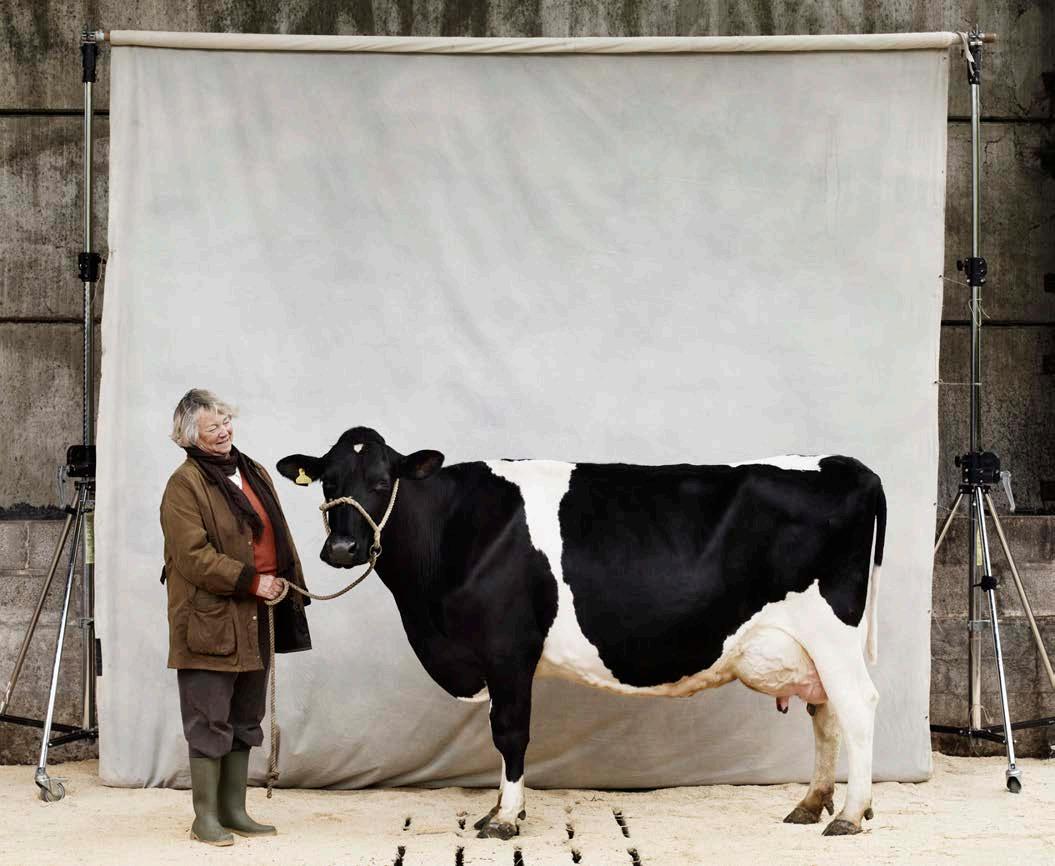
It’s been 60 years since my husband Roger and I started our farming career at Holt Farm; after 50 years as a yoghurt maker and 30 years as an organic brand, I thought it might be interesting to cast my mind back over that time and the changes dairy farming has experienced. In 1961, when Holt Farm was purchased, milk producers in the UK numbered around 100,000, with an average herd size of 22. Today 90% of those farms have gone, and a herd of 200 is more common.
A GROWING FAMILY
In 1961, Roger and I were able to secure the 150acre Holt Farm in Blagdon, North Somerset. The farm had accommodation for 35 cows and a small milking parlour. We quickly decided that the land, which tended to be wet, didn’t really suit sheep, so we started to increase the number of dairy cows. We also increased the size of our family; Sarah, born in 1962, was joined by Tim in 1963. Amanda completed our family in 1969.
In 1970 we took the opportunity to purchase the neighbouring 40-acre Lag Farm, after arranging further borrowing. We were up to about 150 cows on 200 acres. Later on, we bought Merecombe Farm across the road; this added another 90 acres, but the land needed reclaiming. Eventually we added a milking parlour; we milked most of the herd here in the summer, taking Holt for silage.
YOGHURT FROM LEFTOVERS
Using converted buildings at Lag Farm and secondhand equipment bought from a recently defunct
milk collection centre, we took the first tentative steps to trial the making of yoghurt. Holt Farm lay beside a busy road, and we had also launched into ‘pick your own strawberries and sweetcorn’, as well as growing and selling potatoes.
We had established a small café with homebaked scones and jam, with cream from our dairy herd. Yoghurt was the perfect solution for using the skimmed milk left over from making cream, though it was still very much a novelty back then.
In 1974 we began making yoghurt for local shops. The new enterprise took up more and more of Roger’s time; I had always been involved in keeping the books and this became my prime input for the farm. However, I had become increasingly fascinated by the breeding of British Friesians, and this became an all-consuming passion!
FULFILLING A VISION
After Roger died in a farming accident in 1990, I took on the responsibility for the farm as, together with our son Tim, we decided to fulfil his vision for the business. At the time the farm covered 350 acres and the yoghurt business employed 135
AWARD-WINNING DEDICATION
Yeo Valley Organic co-founder Mary Mead OBE recently won the Holstein UK’s Lifetime Achievement Award for dedicating more than 20 years of service to the dairy industry and British Friesian breed.
Find out why
people. With Tim joining Yeo Valley, Roger’s existing management team and the talented individuals who have since joined us, the business has grown to formerly unimaginable heights.
CONVERTING TO ORGANIC
The decision to convert the farm to an organic system in 1994 was a logical progression to help us become more self-sufficient; of course, the success of the Yeo Valley Organic products meant there was also a growing demand for organic milk. However, organic is no easy choice – nor is it quick; it was over eight years before we achieved our organic status across all the land.
The use of artificial fertilisers and pesticides is, of course, prohibited and it has been fascinating to observe how well the land and animals have reacted to the change to a more natural way of farming.
INCLUSIVE FARMING
Over the years it has been a privilege to witness more women deciding they would like to join the farming industry; noticeably women working with livestock. At Yeo Valley Organic’s own farms, we are fortunate to have equal numbers of women and men working on the farm.
It has been a pleasure to observe an inclusive environment for all, where everyone feels valued and part of a team. What a journey it has been.
Find out more
n Discover more about Mary Mead and Yeo Valley Organic at yeovalley.co.uk
FOOD & DRINK
mygreenpod.com INTERNATIONAL WOMEN’S DAY 23
Yeo Valley Organic is a My Green Pod Hero at mygreenpod.com
PLANNING AN ECO WEDDING
Why to say ‘I do’ to a sustainable wedding at River Cottage HQ in Devon
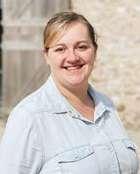
Lucy Edwards, wedding coordinator at River Cottage, is breaking the mould in the wedding industry and helping couples to go green when planning their big day.
Sustainability always takes centre stage at River Cottage HQ – whether we’re talking about the animals raised, the vegetables grown or the 100 acres of land that allow both privileges.
In all undertakings on this organic farm in the Devon Area of Outstanding Natural Beauty, the team aims to inspire people to grow, source and cook food in ways that enhance their lives, increase their wellbeing and achieve a closer connection to natural, sustainable and ethical sources of food.
Weddings at River Cottage are no different; Lucy champions this same philosophy when welcoming couples to the heart of the farm to plan and celebrate their special day.
STRESS-FREE PLANNING
A wedding should be one of the best days of a person’s life, but so often the celebrations result in unnecessary plastic, wasted food and single-use items being discarded after the big day. The industry is becoming more aware of these issues – and so are wedding couples. This change is vital not only for the industry itself but for the future of people and the planet, too.
There’s a lot to think about in the run-up to the big day, meaning sustainability might not always be the most pressing concern. River Cottage supports couples through every step – from setting the idyllic venue to planning a delicious seasonal menu – creating more time for couples to consider the impact of smaller details.
A WEDDING FEAST
River Cottage’s sensational seasonal food is of course a core draw to this unique eco-conscious venue. With any wedding menu at River Cottage, the welfare of the animals raised is as high as it can be, vegetables are grown without any unnecessary chemicals and the soil and land surrounding both are full of wildlife and nutrients.
Any fish that feature on the menu will be sourced from small local boats, without trawling nets, to create minimal impact on the ocean.
River Cottage has a principle of SLOW – seasonal, local, organic and wild – food, which means that menus are formed around the season as well as the food you love. This ethos allows produce to be sourced from the River Cottage gardens, neighbouring farms and the beautiful Devon countryside and coastlines, keeping the carbon footprint as low as possible.
River Cottage also specialises in showstopping vegan and vegetarian wedding menus.
Find out more
n If you’d like to speak to Lucy or find out more about a wedding or special event at River Cottage, get in touch with the team at weddings@rivercottage.net
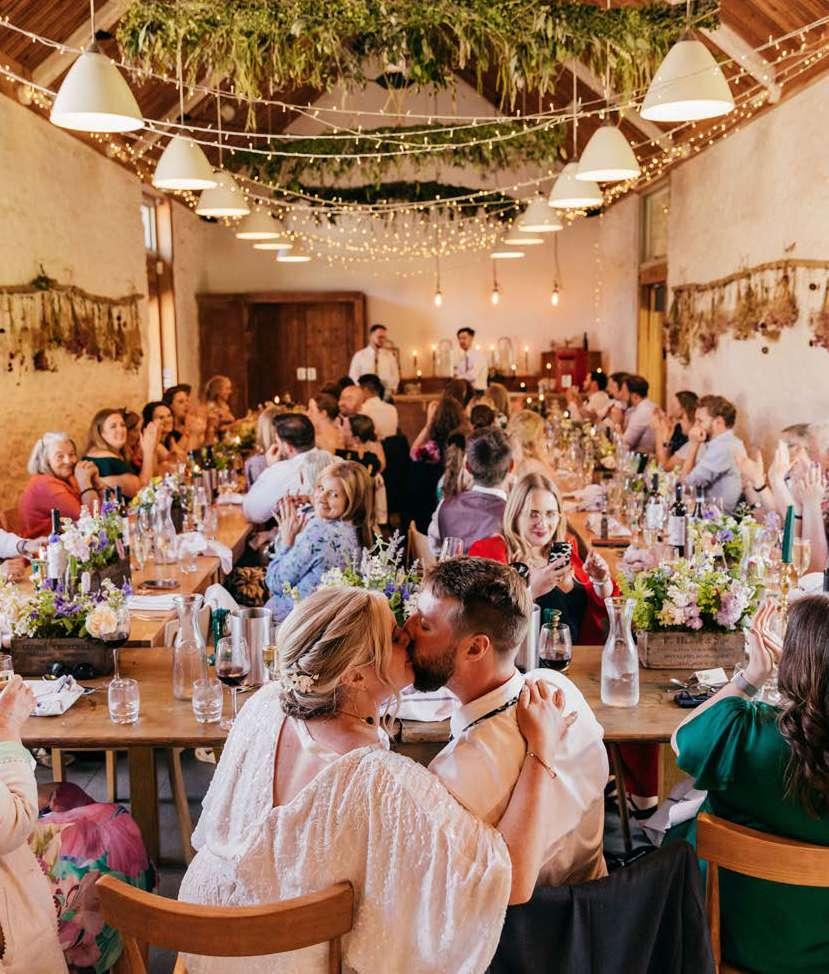
ECO WEDDING TIPS
Here are River Cottage’s top tips for planning an eco-conscious wedding:
n Choose a venue and suppliers that share your ethos, for example using recycled, organic or ethically sourced materials.
n Choose local suppliers to reduce transport emissions.
n For your favours, consider edible gifts, seeds for the garden or even plants, all packaged up in recyclable or compostable materials.
n Keep confetti as natural as possible and ensure it is biodegradable.
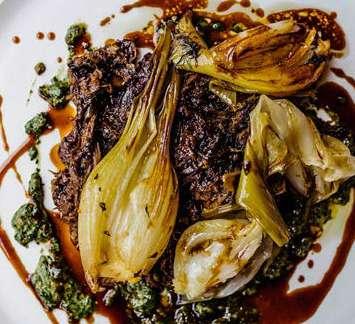
n Think about how any props or decorations can be reused after the big day; if you can’t make use of them yourself, donate or regift.
n Consider pre-loved dresses, suits, jewellery, props and decorations.
n Consider hiring rather than buying certain items.
n Preserve your flowers –or consider dried to start with!
n Keep your menu SLOW (seasonal, local, organic and wild).
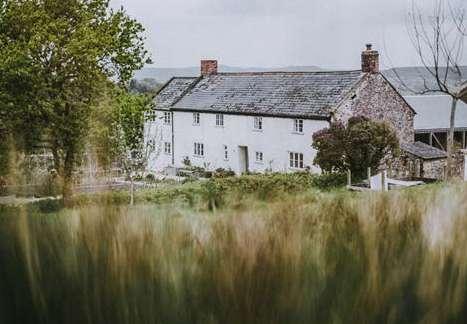
FOOD & DRINK
CLOCKWISE
24 INTERNATIONAL WOMEN’S DAY mygreenpod.com
River Cottage’s Threshing Barn is a unique venue for the big day; the farm sits in the Devon Area of Outstanding Natural Beauty; menus follow SLOW food principles; Lucy Edwards, wedding coordinator at River Cottage
Coffee is a shade-loving plant; away from direct sunlight its maturity is slow, giving complex and delicious flavours time to develop. While mass-produced sun-grown coffee provides a greater yield it can be much more damaging to the soil, wildlife and farmers.
In a study comparing coffee plantations in Guatemala, overall bird abundance and diversity were 30% greater in shaded farms than in ‘sun farms’. 184 bird species – including 46 migratory bird species – were found on a single shadegrown coffee site in Mexico. In contrast, as few as six to 12 bird species are found in unshaded coffee monocultures.
Thankfully, shade-grown coffee is gaining popularity among ethical shoppers and coffee aficionados who won’t compromise on taste.
‘Shade-grown and bird-friendly coffee is much less known in Europe than in North America, where there is much more awareness of these principles’, explains Bird & Wild coffee company founder Guy Wilmot, ‘but it’s starting to gain traction here, too.’
When Guy launched Bird & Wild with the RSPB in 2017, he brought 10 years’ experience in the coffee industry – spanning everything from importing to roasting and working for a well-known brand.
‘I had stumbled upon the Bird Friendly Certification at a big coffee trade show in America’, Guy tells us. ‘I loved the idea that we could help protect nature and bird life by buying coffee from farmers who wanted to protect biodiversity and make great-tasting coffee at the same time.’
THE COST OF COFFEE FARMING
In nature coffee is a shade-grown plant, yet since the 1970s the majority has been grown on huge tracts of land in monocultures on ‘sun grown’ plantations. This means that, like wheat or barley, the coffee plants are grown in direct sunlight, which increases the yield and even sometimes allows two harvests a year. This is great for lowering costs and increasing production, but it has many downsides for the environment.
‘Sun-grown coffee can lead to soil depletion, soil erosion, a fall in soil fertility and an ever-growing need for more fertilisers, since the intense farming saps the natural fertility of the soil’, Guy explains. ‘Since they are monocultures and there is heavy use of pesticides to reduce insect populations –which eat the coffee cherries – there is less habitat for the migrating birds and less food for them to eat, which causes a fall in migrating bird populations.’
Migrating birds, one of the unsung heroes of the environment, perform a crucial role for nature and biodiversity. They rely on their habitat for nesting and a healthy diet rich in insects, and suffer when it is destroyed for monocultures such as coffee.
‘The fact that there is a way for coffee farmers and migrating birds to coexist for the long term makes so much common sense to me’, Guy tells us; ‘it doesn’t have to cost the world.’
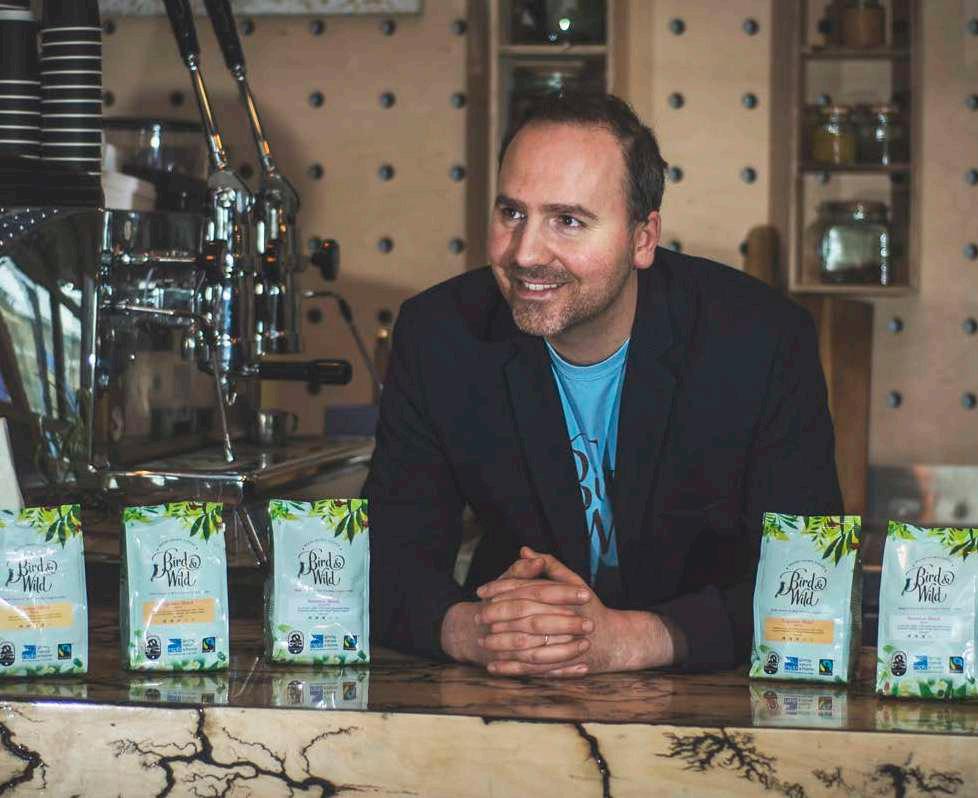
The birds & the beans
Shade-grown coffee supports biodiversity and migratory bird populations – and it’s set to be the next big thing
Find out why Bird & Wild coffee is a My Green Pod Hero at mygreenpod.com
BIRD FRIENDLY CERTIFICATION
Bird Friendly Certification, developed by the USA’s Smithsonian Migratory Bird Center, is the world’s only 100% Organic and Shade Grown coffee certification. It guarantees that every bean has been produced organically and under high-quality shade. Shade-grown coffee is grown under a forest canopy, which provides habitat for birds and protects soil health. 90-120 species of plant and 13-58 species of tree are typically found on a single certified Shade Grown coffee site. Herb diversity is typically three to four times higher and animal diversity is supported, too; 609 species of insect were found in a Shade Grown coffee site in Mexico and in a Shade Grown study in Indonesia, bee populations increased by 90%. A Shade Grown Coffee site in India found 28 species of mammals in one site alone.
Typically, soil moisture is 42% lower in unshaded plantations than in shaded plantations and there is significantly less runoff of surface water.
Bird & Wild coffee is certified Bird Friendly and Fairtrade; these standards help farmers charge a higher price for their coffee and support their families. The certifications work hand in hand to create a coffee that is truly kind to the environment and farmers alike. Only a limited number of coffee plantations work with Bird Friendly certification, so Bird & Wild coffee changes with the seasons to guarantee supply all year round.
The company was launched with the RSPB charity in order to support bird populations at home in the UK while also helping coffee farmers to protect birds abroad. Since 2017, Bird & Wild has donated over £60,000 to the RSPB.
FOOD & DRINK
mygreenpod.com INTERNATIONAL WOMEN’S DAY 25
Guy Wilmot, founder of Bird & Wild, is helping coffee farmers and migratory birds to coexist
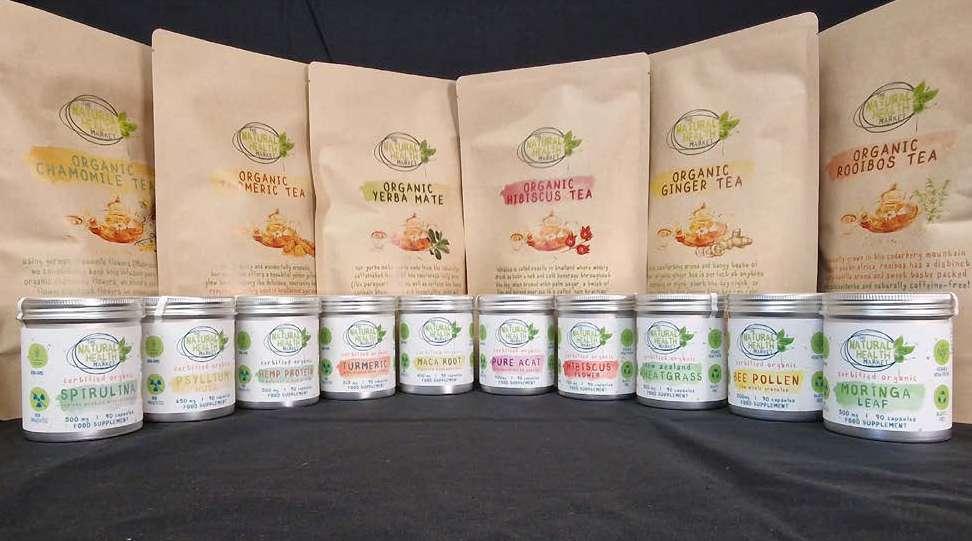
This one-stop shop for organic superfoods has a multi-cultural approach to wellbeing
Natural health made easy
From Ayurvedic, Chinese and South American superfoods to staples of the European hedgerow, there is no shortage of products geared towards wellbeing.
The good news is that you don’t need to travel the world to discover them; Ian and Aon Cook have created a one-stop shop for discovering topquality organic teas and supplements from all over the globe – delivered straight to your door.
SHARING DISCOVERIES
After spending 20 years travelling the subcontinent and South East Asia, Ian and Aon became accustomed to using natural botanicals in their day-to-day lives. When it was time to return to the East Midlands with their new family, they felt inspired to bring the products they’d been using back to the UK.
‘We didn’t expect it to turn into a full-time job’, Ian admits; ‘our motivation was to be able to continue using these products daily and share them with family and friends.’ This soon spiralled into an online shop – The Natural Health Market offers an eclectic, essential selection of extremely highquality organic herbal teas, nutrition supplements and whole foods as part of an ever-expanding range.
‘We didn’t actually consider many of the products as health foods’, Ian tells us, ‘they are just food when you live in South East Asia. When we returned to the UK after an absence of 20 years, we were quite shocked by the standard of food available and the proportion that is highly processed. It has just got worse in the last 10 years, and we have found ourselves becoming increasingly righteous about why people should eat raw, nutrient-dense foods.’
The contrast on returning to the UK was stark; ‘Health and wellbeing come naturally in Asia’, Ian explains; ‘eating fresh produce, cooking from scratch, eating and visiting outdoor sites and spending time in nature are part of life. It was only when we arrived back to a highly industrialised
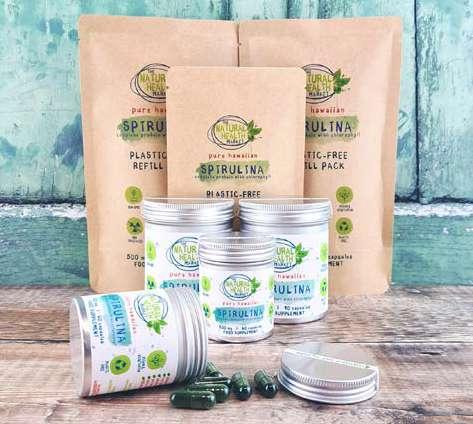
CLOCKWISE
A selection of organic, unprocessed teas and supplements; hydration and spirulina capsules are Ian's top wellbeing hacks society that we realised we missed it. We are trying to bring a bit of Asian wellbeing and mindfulness energy back with us!’
THE QUEST FOR QUALITY
After all the travelling and immersion in different –arguably healthier – cultures and lifestyles, what are Ian’s top takeaways for improving wellbeing? ‘Hand on heart? Drink two pints of filtered water within 40 minutes of waking up in the morning. Hand on wallet? Our spirulina capsules. You could almost live on them.’ In addition to these lifestyle hacks Ian advises prioritising meditation, hydration and eating raw, organic and nutrient-dense foods.
The range on The Natural Health Market has grown from personal favourites to include topquality versions of products requested by friends, family and customers. ‘Many of the products are
Find out more
single-ingredient unprocessed botanicals’, Ian says; ‘technically they’re widely available, but our products have been made – nearly by hand – using the finest quality ingredients.’
Neither Ian nor Aon ever intended to manufacture their own products, but on arriving in the UK they quickly realised the quality of product ‘wasn’t here.’ ‘We could source some products at the quality we needed’, Ian tells us, ‘but when we sent them to manufacturers they were just destroyed. It became very evident that if we wanted the quality we were used to, we would have to do it ourselves.’
This was (and continues to be) a huge undertaking: ‘Every organic product we sell, we make – from raw ingredients’, Ian says. ‘Neither of us had experience in manufacturing, so to say the last 10 years have been a learning curve would be an understatement!’
But the hard work has paid off, and Ian says that even in an increasingly competitive market, their products stand out. He has grounds for this confidence; each month over 50% of sales go to existing customers, which is a very high statistic in the world of online retail.
As customers become increasingly savvy and hungry for products that are unpolluted and unpolluting, why aren’t more companies following Ian and Aon’s lead? ‘I think large-scale international brands absolutely could produce the quality of product that we do’, Ian acknowledges, ‘and there are many motivated farmers and growers who are passionate about getting their products into the hands of ethical manufacturers. But they never will, because we use top-of-the-market products, and they cost more money. If large-scale organisations with huge overheads were to use the quality of ingredients that we use, they wouldn’t be able to price the products competitively.’
ORGANIC IS KEY
By prioritising top-quality ingredients, Ian and Aon have ended up with a range that is almost entirely organic. ‘We do stock a few extracts which are not organic’, Ian accepts, ‘but only if there is no organic alternative. Where there is an organic version of the product or ingredient, we use it. Food that hasn’t been grown from a genetically modified seed and blasted with chemicals should be the norm.’
Ian comes from an agricultural background and worked on farms after leaving school. ‘Nature becomes engrained in you when working the land’, he shares. ‘Most of us are aware of the dangers of handling chemicals and wouldn’t use weedkiller without gloves or protection, so why would we eat food that contains these same chemicals? If I can’t trust governments and the industrialised food industry to provide my family with safe, nutrient-rich foods, other than growing our own produce, buying organic is the best we can do.’
n Browse and shop the full range of organic health foods at thenaturalhealthmarket.co.uk
FOOD & DRINK
26 INTERNATIONAL WOMEN'S DAY mygreenpod.com
Women in BEAUTY
Natural beauty expert Janey Lee Grace spotlights the female entrepreneurs shaping sustainable beauty

This International Women’s Day, let’s shine a spotlight on the remarkable women driving change in the world of sustainable beauty. From crafting organic skincare to pioneering eco-friendly packaging, there are female entrepreneurs who are not only revolutionising the industry but also championing environmental stewardship and social responsibility.
ORGANIC HAIR CARE
One amazing woman is Tabitha James Kraan, the visionary founder of her eponymous brand. With a commitment to organic ingredients and mindful production practices, Tabitha offers a range of luxurious hair care products that not only enhance beauty but also respect the planet.
The ethos is succinctly captured in Tabitha’s own words: ‘Beauty should be about health and
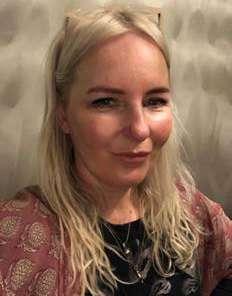

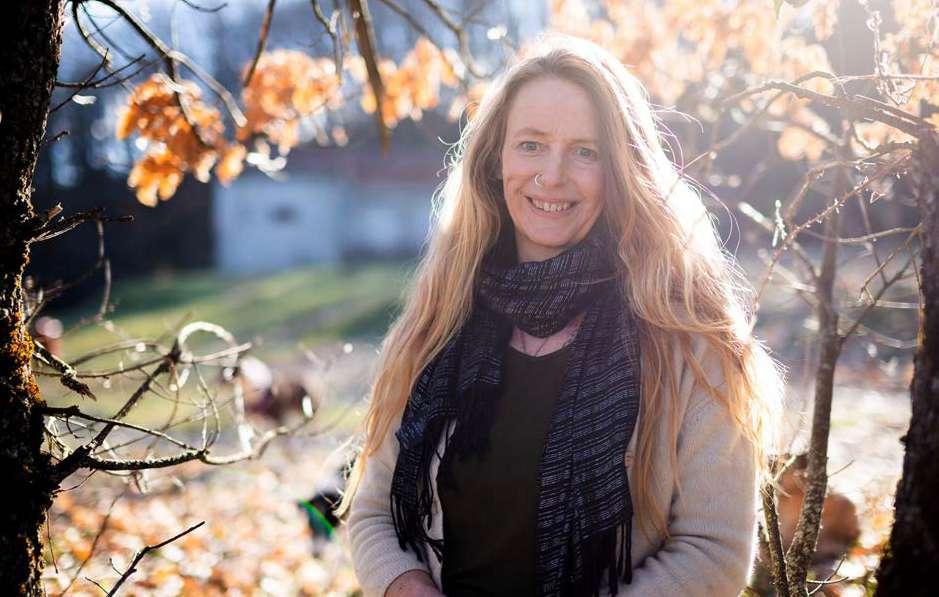
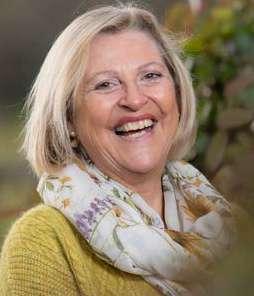
wellbeing, for us and the planet.’ I can’t exist without the gorgeous 4 in 1 Conditioner, and the Volumising Dry Shampoo is a gamechanger!
NATURAL SKINCARE
Charlotte Vohtz founded Green People in 1997 after her young daughter, Alexandra, started battling multiple skin allergies and eczema.
Charlotte realised there was nothing on the market that met her needs. Green People has led the way on organic and natural skincare ever since, and has a fantastic range.
Weleda is one of my favourite brands, and the MD of Weleda UK is the incredibly influential Jayn Sterland. She is the current No. 1 in 2023’s ‘Who’s Who in Natural Beauty’ – and this is her seventh time in the top spot!
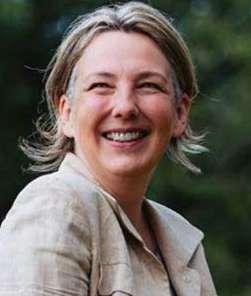

HOLISTIC WELLNESS
Nutritionist and author Trish Tucker-May takes a unique approach to beauty from the inside out. Her holistic perspective highlights the importance of nourishing the body to achieve radiant health and support a natural menopause.
If you want a plant-based escape from it all, Wellness and Wilderness is a bespoke off-grid retreat in Spain run by Fay Victoria Durrant. It stands out for its dedication to sustainability.
SUSTAINABILITY DRIVES SUCCESS
These pioneers represent just a few of the inspiring women leading the charge in the UK’s eco-conscious beauty landscape. Over recent years, the market has witnessed a notable shift towards sustainability and ethical practices.

Consumers are increasingly seeking transparency, cruelty-free formulations and eco-friendly packaging. Female entrepreneurs have risen to the occasion, offering innovative solutions that prioritise both beauty and the planet.
From small-scale startups to established brands, women are driving meaningful change in the beauty industry, proving that sustainability and success go hand in hand.
As we celebrate International Women’s Day, let’s continue to support and celebrate these pioneering women who are shaping a more sustainable and inclusive future for us all – and our planet.
Find out more
n Discover more natural beauty tips from Janey at imperfectlynatural.com
mygreenpod.com INTERNATIONAL WOMEN’S DAY 27 HEALTH & BEAUTY
LEFT TO RIGHT Tabitha James Kraan with her Organic 4 in 1 Conditioner; Green People founder Charlotte Vohtz; Fay Victoria Durrant, Wellness and Wilderness; Weleda UK MD Jayn Sterland with the new Weleda Skin Food Cleansing Balm; nutritionist and author Trish Tucker-May
IF I RULED THE WORLD
Gillian Burke, biologist and BBC Springwatch presenter, discusses why we need to shine a light on the invisible barriers to positive change
In the world of wildlife film-making, an idea we hold close is that if we show people the beauty of nature, they will fall in love with it, want to care for it and help protect it.
It’s a belief that has such good intention, but in the 30 years I’ve been doing this job, behind the camera and more recently as a presenter, I’ve started to question whether this mantra is enough.
SPOTLIGHT ON POSITIVE CHANGE
After all the research and reporting it struck me that, across so many measures of pollution, biodiversity and habitat loss, rather than getting better many things have become exponentially worse.
Meanwhile, much of the burden of responsibility has been placed on ordinary people calculating their carbon footprint and making sweeping lifestyle changes to fix the environmental crisis.
Of course we can all do our bit, but without a system that supports us to make these changes there is only so much we can do. To my mind, we shouldn’t even be in a position of having to choose the ‘lesser of two evils’ when thinking about what to eat, what to wear and how to travel.
All this sparked an idea for a podcast: its purpose would be to shine a light on the invisible, sprawling barriers to positive change that exist in the world. What really needs to change? Who are the real culprits? How do we bring about positive change?
With 8 billion people on the planet, there are probably 8 billion different versions of what positive change actually looks like. Buckle up! It’s going to be a long podcast!
WOMEN WORKING FOR RADICAL CHANGE
As much as I love wildlife and nature, I’ve always been drawn to human stories that bring hope for the future. The If I Ruled the World podcast seems like the perfect way to do both, seeking out the brilliant experts, scientists and campaigners that are making profound change happen.
On the podcast, I’ve been fortunate enough to speak to, and take inspiration from, some incredible women who have dedicated their lives to radical systems change.
I spoke to Candace Rondeaux, a distinguished investigative journalist and academic, about the intersection of the climate crisis and global politics, alongside the critical need for progressive and ethical leadership in the environmental sector.
The podcast also highlights the work of Jojo Mehta, CEO of Stop Ecocide International – an organisation she co-founded with the late Polly Higgins, barrister and legal pioneer.
Jojo’s work has revolved around supporting the establishment of ecocide – the mass damage and destruction of ecosystems – as a crime at the International Criminal Court. This work helps shift the significance of severe environmental damage into the criminal sphere, holding people personally to account with criminal responsibility and creating a level of deterrence to destroying nature that regulation does not cover.
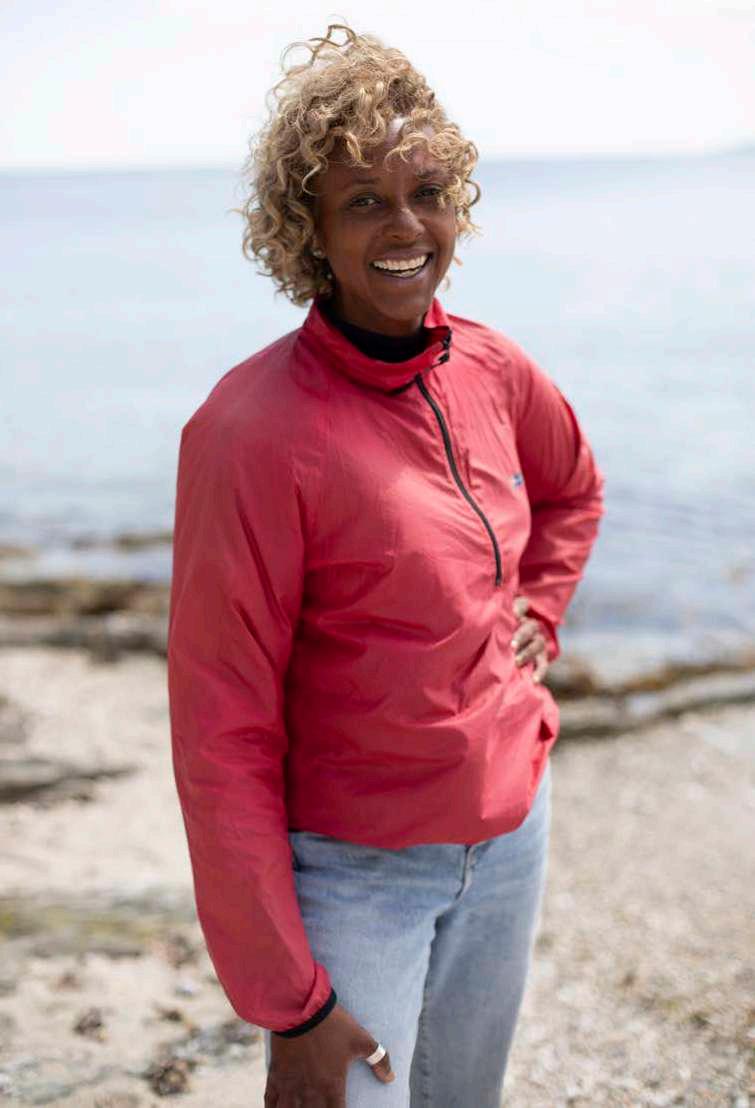
HOPE FOR THE FUTURE
Until I started the podcast, I bought into the idea that we need to ‘burn the house down’ and start again. However, in researching each episode and speaking to my guests, I discovered that in many cases a lot of legislation already exists but is either being weakened or simply not enforced.
I find this really intriguing and all together more hopeful because, in other words, this isn’t our first rodeo and we can look to strengthening and evolving existing systems to tackle social and environmental injustice. With every guest I speak to, I learn more about the tools we already have. We have the right expertise, mechanisms and frameworks in place to address the urgent needs of planet and people.
Of course, I ask every guest what they would do if they ruled the world. Everyone has a different version of what positive change looks like and how to get there. But for me, every answer helps me believe that there are incredible people out there – leaders in their field – who can help us get to where we need to be.
Find out more
n ‘If I Ruled the World ’ is available now on Apple, Spotify and all major streaming platforms. The podcast is being promoted and sponsored by Triodos Bank, which has been operating in the UK for nearly 30 years and serves to drive systems change through finance.
ARTS & FASHION
28 INTERNATIONAL WOMEN’S DAY mygreenpod.com
PHOTOGRAPHY NINA
CONSTABLE
Iwas floundering at bit. I was in Valencia teaching English after completing my masters in Global Development in Copenhagen and working for an international charity. I knew that the teaching would only last three months; then I would be back in the UK and would have to make my next move – but I had no idea what that was.
All I knew was that impulse – that a lot of people feel these days, I think – to dedicate my time over the next 10 years to the fight against the climate crisis. I just needed to figure out how I could be most useful, and how to do it in a way that I love.
It was a visit from Dad that seeded the idea. He is a documentary-maker and has lovingly encouraged my presenting and interviewing over the years. Over a glass of sangria he proposed we bring our skills together and put them into action.
The idea was to make documentaries that celebrate people who are creating solutions to the climate crisis and spend our time making content that would inspire meaningful change. We batted around various concepts, but the idea of telling green stories that are rising from the ground up – through British businesses, communities and individuals – just got under our skin. The idea of Green Britain TV was born.
DOING IT RIGHT
There followed a lot of research, discussion, late nights, arguments (so many of those) – but also a sense of optimism and excitement that this could work. We decided that the way forward was to jump in with both feet and start filming – we’d figure out the finances later. So on a shoestring, with a secondhand camera and some brightly coloured blazers from our local charity shop, we filmed our first piece at a sustainable hairdressers.
While our ethos was just to get going, it was also really important to me that we did this right. My concern was that if we took the traditional model of production and charged our clients for our work, we would become just that: a traditional production. The companies we film would have editorial input and our content would be seen as advertising rather than editorial, authentic and transparent short documentaries.
CHAMPIONS OF SUSTAINABILITY
We want to celebrate the champions of sustainability, to demonstrate that people are making a committed effort to change their business models, to organise community engagement or to build businesses that do it better from the ground up.
We want to uncover the people behind the ideas and innovations, to explain their lightbulb moments. We tell a short-form story about why they think this green transition is so important that they have staked their livelihoods on it.
FINDING HOPE
Two criticisms seem to be common of journalism today: too little coverage of the climate crisis, or coverage so dark that it is causing eco-anxiety or apathy. We decided that we wanted to tell positive and uplifting stories about the solutions.
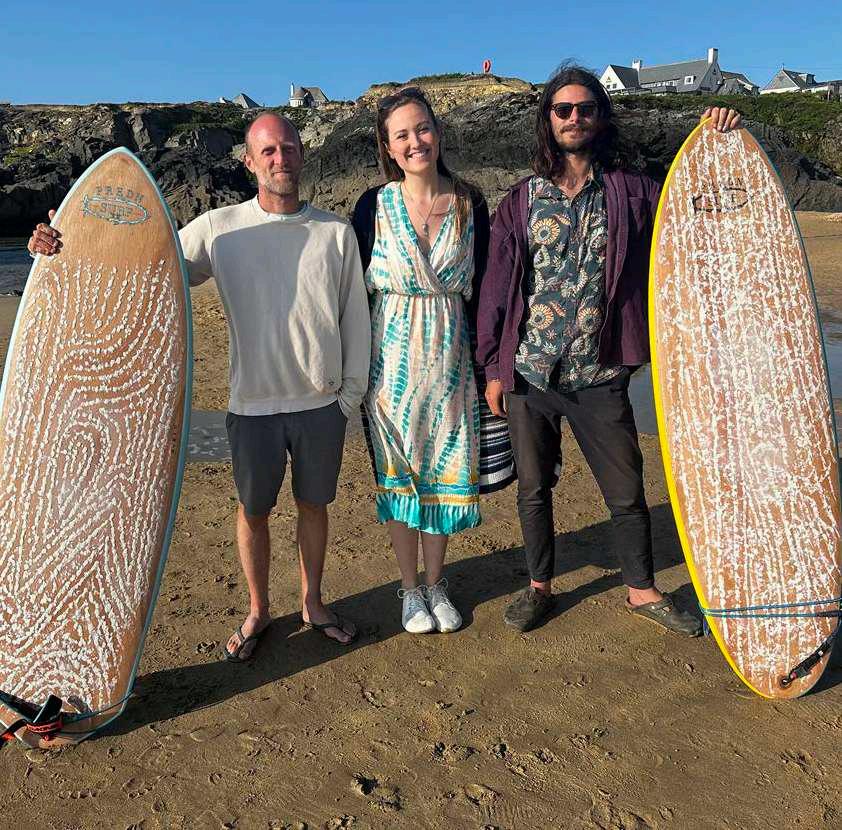
Discovering Green Britain
There are plenty of people fighting back and offering the tools for us all to do the same.
We want to take a positive stance without making light of the issue, and hope to strike a balance of contextualising the problem without lingering or being too doomsday-y about it. Ultimately people want to watch programmes that are entertaining and engaging and that give a sense of hope.
ONLINE CONTENT
We launched Green Britain TV in November 2023 as an online platform. You will find short documentaries on solutions to the climate crisis
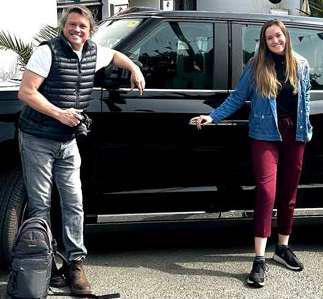
Find out more
that are made or conceptualised here in the UK. Whether you’re interested in our food or transport systems, climate tech, eco-friendly projects, staycations or community projects, you can find it in our Eat, Move, Live and Innovate sections.
MAKING CONNECTIONS
In the short term, we want to tell as many stories as we can and get them out there. We need funding to do that so we’re in that stage at the moment. In the longer term we are hoping to contribute to behavioural change. We want people to watch our documentaries and think, ‘Wow I didn’t know that was out there. I am going to switch to an alternative product, get involved with that community project, start my own business, switch my energy provider, buy less or buy better or shop more locally.’
Inspirational visual storytelling can be a powerful tool to nudge someone to make a change they have been considering. We are trying to provide a way for our viewers to meet the people behind the solutions and to make that connection with that company or organisation by providing direct links to their websites. There is so much to celebrate in Britain –and we want to be the channel to showcase it.
n Discover and browse content on Green Britain TV at greenbritaintv.com
n If you have an idea for a green story, please email it to Emily and the Green Britain team at info@greenbritaintv.com
ARTS & FASHION
mygreenpod.com INTERNATIONAL WOMEN'S DAY 29
Emily Malkin, co-founder of Green Britain TV, on the new platform showcasing solutions to the climate crisis
Emily Malkin is touring the UK with her dad to tell the stories behind inspiring climate solutions
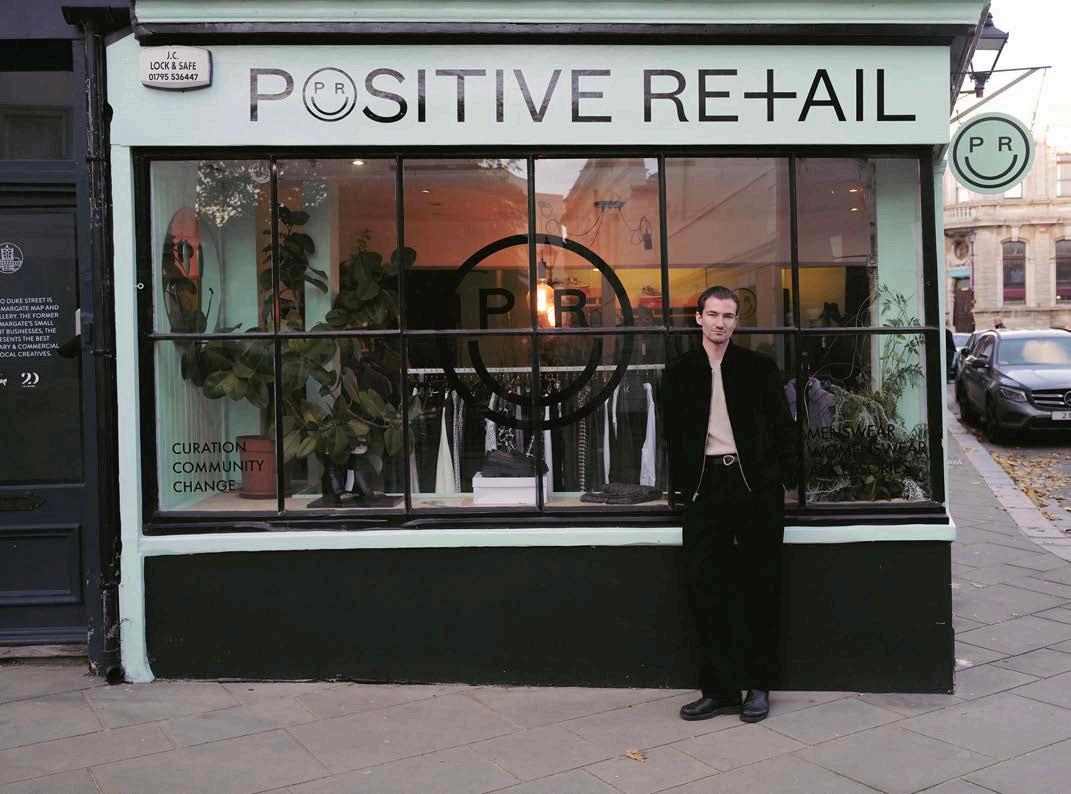
Women in fashion
TFind out more
n Stay up to date with Brett and Scott on Instagram: @twinbrett and @twinscott
Model twins Brett and Scott Staniland reveal the brands to celebrate this International Women’s Day
his International Women’s Day calls for us to invest in women to accelerate progress –so we wanted to showcase some amazing female founders in the fashion world who are doing just that.
The talented women here head up companies that make brilliant alternatives to our run-of-themill fashion brands, which are accelerating nothing but overconsumption and a polluted planet.
Of course we advocate not buying anything new but, if you’ve decided to treat yourself, give some of the below brands the love they deserve.
ANNA WOODS, POSITIVE RETAIL
Ex-buyer Anna Woods started Positive Retail as a small secondhand pop-up store in her home town of Ramsgate in 2020. Over her 20-year career she had watched the face of the high street and industry change drastically to a machine prioritising newness, and felt burnt out by the industry and the waste. Positive Retail has some incredible preloved luxury gems online and in three permanent stores in Ramsgate, Margate and Deal. Positive Retail also has a pop-up in St Leonards until Easter. I’ve personally
found some incredible finds. Anna knows she could grow quicker but prefers the organic route. positive-retail.com @Positive_retail
ANNA FOSTER, E.L.V. DENIM
This is denim done differently. Anna Foster founded E.L.V. Denim in 2018 in a bid to encourage others to champion local manufacturing and slow fashion choices. Using 100% upcycled fabric, E.L.V. Denim crafts timeless fashion pieces, breathing a second life into denim and other materials originally destined for landfill. Anna has collaborated with the likes of Swarovski, Hyundai, Gabriella Hearst and, most recently, The Outnet. elvdenim.com
@elvdenim @annafoster
SHILPA SHAH & KARLA GALLARDO, CUYANA
Cuyana creates timeless essentials for the modern wardrobe. For me it’s a go-to for beautifully made bags, but the brand also offers other small leather goods and womenswear staples. The ‘fewer, better’ ethos is instilled throughout the company, through
partnerships with artisans and craftsmen around the world. Production is responsible and excellent circular initiatives include a care guide and repair service. Once you’re done with your Cuyana bag, you can resell the item on the Cuyana site or donate it to women starting a new life after abuse. cuyana.com/pages/about-us
@Cuyana @shilparshah @kggallardo
KATIE LOPES & NICOLA PIERCY, STRIPE & STARE
With only 3% of all underwear sustainably sourced, Stripe and Stare is on a mission to make sustainable and comfortable underwear for all. The company, which attained B Corp status back in 2022, now has a 100% biodegradable collection comprising underwear, sleepwear and loungewear. Much of its success is down to the fabric used, including TENCEL, which comes from wood pulp and boasts qualities of lightness and exquisite softness, and cellulosic fibres, which produce lightweight fabrics. Stripe and Stare has partnered with Ecologi to plant a tree for every purchase. stripeandstare.com @stripeandstare
‘I've come from a corporate environment and was always answering to men… My reluctance is that I've left that environment and with investors, I'm back in a room asking men for money. I do know I could grow faster if that's what I did, but there's something nice about natural, organic growth.’
ANNA WOODS, FOUNDER OF POSITIVE RETAIL
ARTS & FASHION
PHOTOGRAPHY
LUKE ALLAND @THEEXILEDBRIT
30 INTERNATIONAL WOMEN’S DAY mygreenpod.com
Nestled within the pristine expanse of the Amazon Sacred Headwaters bioregion in Ecuador and Peru, a profound story of resilience, community and environmental stewardship unfolds.
Here, Amazonian women stand as guardians of their ancestral lands, defending the rich biodiversity and cultural heritage of their territories against the onslaught of deforestation, exploitation and climate change.
EMPOWERING COMMUNITIES
In the heart of this ecologically critical region, initiatives like the Yuturi Warmi project in Ecuador and the collective Mujeres Amazonicas, spanning both Ecuador and Peru, embody the strength and dedication of Amazonian women in preserving their environment and way of life.
The Yuturi Warmi coalition, deeply rooted in the Ecuadorian Amazon, harnesses the traditional wisdom of Indigenous women to promote sustainable practices such as organic farming, eco-tourism and community-based education.
By blending ancestral knowledge with contemporary methods, these women empower their communities to thrive while safeguarding the biodiversity of their rainforest home within the Amazon Sacred Headwaters.
Meanwhile, the collective Mujeres Amazonicas, a coalition of women from diverse Indigenous backgrounds in Ecuador, stands as a beacon of resistance against the threats posed by extractive industries and land encroachments within the Amazon Sacred Headwaters.
Through grassroots organising and legal advocacy, these women amplify the voices of Indigenous peoples and confront the systemic challenges to their rights and territories.
A NEW NARRATIVE
In Ecuador and Peru, Amazonian women are not only defenders of the land but also agents of social change within the Amazon Sacred Headwaters.
Challenging patriarchal norms and advocating for gender equality, they redefine the narrative of environmental activism in the region.
By asserting their rights to land ownership and decision-making powers, they forge alliances across gender, ethnicity and nationality, fostering a shared vision of a more just and sustainable future for all within the Amazon Sacred Headwaters bioregion.
Through their tireless fight, Amazonian women are reaching leadership roles in their communities and organisation, paving the way for new generations. But this comes with its challenges.
FEMALE LEADERSHIP
Amidst this struggle, Olivia Bisa, the first female President of the Chapra Nation, emerges as a beacon of courage and leadership. She stands resolutely against the encroachment of oil drilling and illegal activities threatening her ancestral territory.
Olivia Bisa’s steadfast commitment to protecting her land and cultural heritage has made her a target of intimidation and threats. She faces
WOMEN’S LEADERSHIP IN ECUADOR AND PERU
Atossa Soltani, director of global strategy for the Sacred Headwaters Alliance, profiles guardians of the Amazon Sacred Headwaters
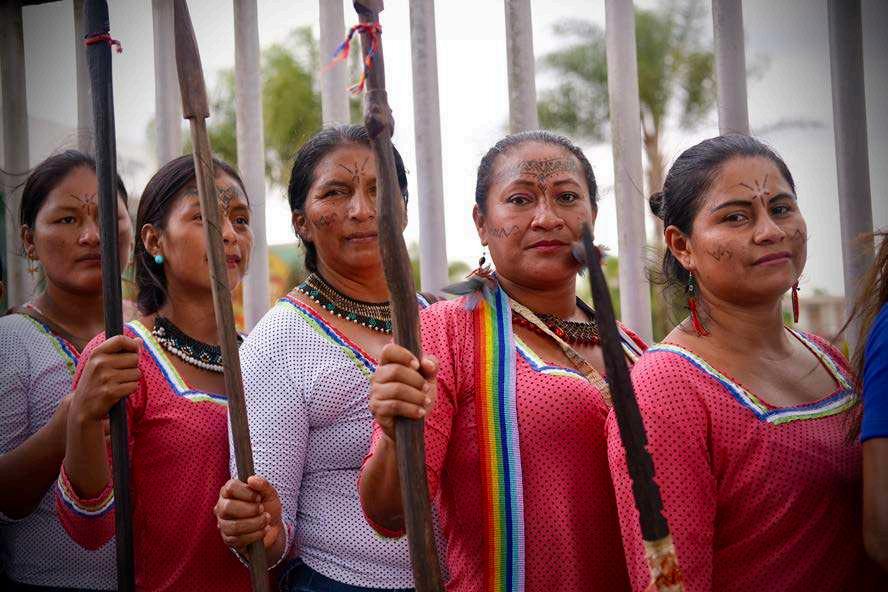
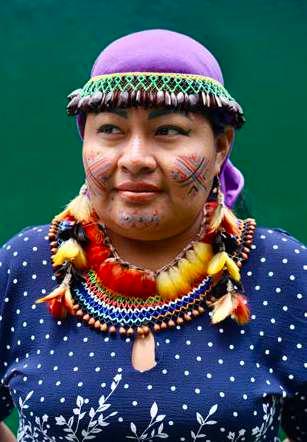
relentless pressure for speaking out against the desecration of sacred sites and the intrusion of oil drilling operations into Chapra territory.
Recent invasions of spiritual sites within Chapra territory, along with illegal activities in neighbouring territories, underscore the urgent need for collective action to defend the Amazon Sacred Headwaters from exploitation and destruction. Despite the risks, Olivia Bisa remains unwavering in her resolve to
safeguard the land, inspired by the legacy of her ancestors and fuelled by the solidarity of her community and allies across the region. Her unwavering courage serves as a reminder of the profound sacrifices and unwavering dedication of Amazonian women in the fight to preserve the Amazon Sacred Headwaters for future generations.
MAINTAINING HOPE
As the Sun sets over the Amazon Sacred Headwaters, casting its golden glow upon the ancient forests and winding rivers, there is a sense of hope and possibility in the air.
The resilience and determination of Amazonian women shine brightly, illuminating a future where the sacred lands of the Amazon are cherished and protected for generations to come. In their hands lies the promise of a more harmonious relationship between humanity and nature, where the wisdom of the past guides us towards a sustainable and flourishing future.
Find out more
n Support The Amazon Sacred Headwaters Alliance and find out more about its work at sacredheadwaters.org
CONSCIOUSNESS
mygreenpod.com INTERNATIONAL WOMEN’S DAY 31
CLOCKWISE
The Ecuadorian Amazon’s Yuturi Warmi coalition promotes sustainability by harnessing the wisdom of Indigenous women; Olivia Bisa, the first female President of the Chapra Nation
PHOTOGRAPHY LORENA MENDOZA
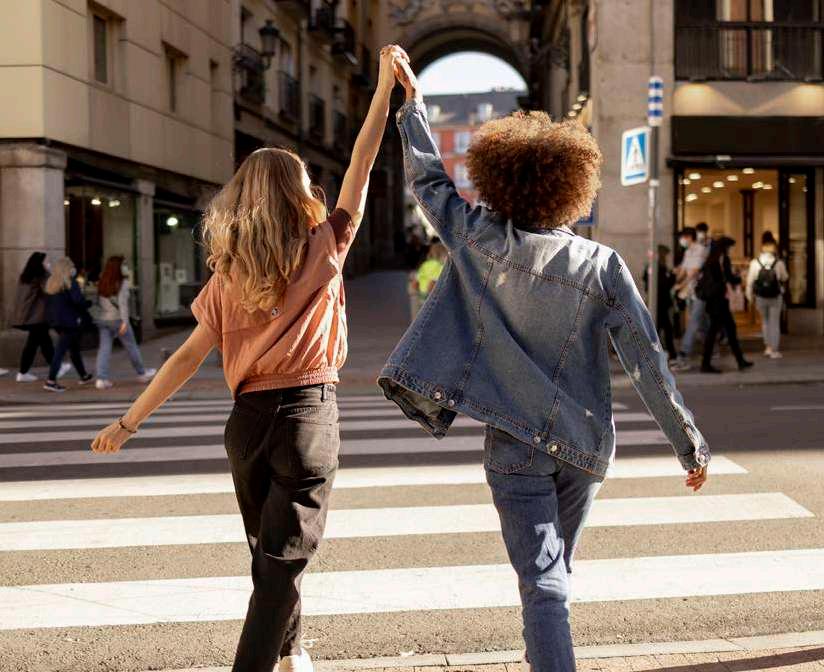
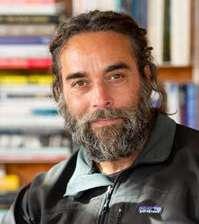
BJarv’s rules
Jarvis Smith believes we can change the world by embracing feminine principles and leadership
eing brought up by my mum – with no biological dad and only what I now understand as toxic masculine males around me – made me the way I am today.
At the time I was scared of most adult men because I associated them with my many experiences of bullying, of both me and my mum. These feelings took root, and as I entered the business world I found I was instinctively drawn to organisations that had been consciously founded on what I would call more feminine principles.
FEMININE QUALITIES
I believe we are born with masculine and feminine traits, and that these traits have different qualities. I would describe masculine qualities as action-based, while feminine qualities foster sharing, feeling and inclusion. What’s important here is that we’re not talking about men and women, but masculine and feminine – and we all all have both qualities, irrespective of what biological sex we are born with.
The first time I really noticed feminine qualities in business was when I saw five amazing women –all leaders in their field – up on stage for a panel debate. I was stunned by the sharing and inclusivity
DAY mygreenpod.com
‘The issue right now seems to be that men made most of the critical decisions that define the reality and societal world view we have inherited. World leaders, business executives, investment fund managers – I could go on – are largely men who are making masculine decisions.’
these amazing women navigated; if those female leaders were making decisions for the whole of society, the world would be a very different place.
The issue right now seems to be that men made most of the critical decisions that define the reality and societal world view we have inherited. World leaders, business executives, investment fund managers – I could go on – are largely men who are making masculine decisions.
A CHANGE IN THINKING
The planet is in a mess. Overconsumption, overuse of finite resources and economic growth at all costs are all, if the science is right, driving us and many other creatures and ecosystems to extinction.
It seems a good time to invoke Albert Einstein’s thinking and accept that we need to stop making decisions from the same thinking that caused the problems. It stands to reason that if more women were making decisions, the effect on the whole would be huge.
FINDING BALANCE
I think of our planet as Mother Earth and the Sun as Father Sun; this seems to be the case for most ancient and Indigenous ways. It’s clear that without one we can’t have the other.
The Sun provides heat and light and the Earth photosynthesises the light to create life, in what seems to be a balanced and easeful relationship.
What perhaps has happened, certainly to our immediate human and conscious understanding, is that we have simply become unbalanced and are now spiralling through a climate crisis.
But what if we unconsciously – or even spiritually – set this up exactly as it was meant to be, so we could evolve consciously through everything we are learning about the system we’ve created and what we can do to change it?
FLIPPING THE SCRIPT
Everything right now is on the table: we have all the abilities, knowledge and experience today to turn things round, but not the right feminine-principled leadership making the decisions for the whole.
Male decisions and men have created an economy that’s killing us and the planet as we know it, but women are the biggest consumers. Women are responsible for £31.8 trillion of the world’s spending – 80% of all consumer spending, or 60% of all annual spending. This means women have a huge opportunity to turn the tables and flip the script in our current paradigm.
It’s empowering to know we can actually change things right now if we choose to change the way money is spent. If spending could be redirected to sustainable products, services and businesses, then the male economic system would simply collapse and give our planet – and us – time to breathe. We owe it to the future generations, don’t we?
Find out more
n Jarvis Smith is co-founder of My Green Pod and founder of the P.E.A. Awards. Upcoming events are at jarvissmith.com
32 INTERNATIONAL WOMEN’S
CONSCIOUSNESS
PHOTOGRAPHY ISTOCK
Embodying the SACRED FEMININE
Inspirational leader Tammy Scarlett explores why we must listen to intuition and create a balance that allows the feminine to thrive
‘People say, ‘How can she possibly believe in such illogical things?’ But the Warrior knows that intuition is God’s language and she continues listening to the wind and talking to the stars.’
I first put that quote, from Paulo Coelho’s Warrior of the Light, on my Instagram page in 2016. At the time I was a little nervous; I was uneasy about how people in my circles would receive such ideas. But I had recently had a profound experience.
I had spent the day in a cold river, moving logs and boulders that represented the energetic blocks in my own life. I had been so deeply connected with nature that day, and had revealed and overcome my own obstacles in such a powerful way, that in the moment of posting, that quote was overwhelmingly the most clear and true thing I felt. So, I posted it.
The quote is actually about a man – the book reads, ‘How can he possibly believe…’ – but I learned a while ago that division around gender, in any sense that oppresses or prevents growth and becoming, is only an imagined construct which I can choose to allow or not in my own mind. I intentionally replaced the ‘he’ with ‘she’ so I could fully receive and embody the words into my being.
MY ‘AH-HA’ MOMENT
A mentor, Yvonne Bryght, once said to me, ‘Happy is the woman who approves what she chooses.’ I knew in that moment that when making future decisions, I must be in my full agency of self and give myself my full backing and support for each decision I make, the way I had previously hoped someone else out in the world would.
The phrase stuck with me, and when I later asked the origin my mentor said it is a verse from the Bible. Having been incubated by the church for the first 25 years of my life, I quickly replied that I was very familiar with the Bible and had never heard of such a verse. ‘Oh’, she said, ‘it says ‘Happy is the man who approves what he chooses,’ but I just updated it for us women.’
It was an ah-ha moment for me. When I felt the way the phrase felt to me the ‘Happy is the man’ way, it felt true and wise; when I felt the way the phrase felt as ‘Happy is the woman who approves what she chooses,’ I felt I could begin to embody it. I could feel the difference in my being.
What do I mean by ‘sacred embodiment of the feminine?’ There are masculine and feminine sides to everything. We have a choice in how we show up

as women and as any gender, we have a choice in how we show up as the feminine aspects of ourselves. The ‘showing up as’ is the embodiment. Sacred means ‘set apart for the highest purpose.’ So, my ‘sacred embodiment of the feminine’ is how I am showing up as the feminine aspects of myself for and in my highest possible purpose.
A SPACE FOR THE FEMININE
Fragility and tenderness are part of what the feminine uniquely brings to the universe. This makes her vulnerable in a society built on masculine dynamics, requiring her to ‘suit up’ in masculine traits in order to guard her exterior and experience success as defined by current cultures.
But the feminine holds an indestructible centre core made of the essence of God. It is how women have lifted cars off babies and why a mother will throw herself to her death to save her child.
In many cultures the womb is regarded as a God space and even shrouded during ceremony to protect it as such. In death and in life, this inner core of the feminine cannot be harnessed or extinguished.
Find out more
How, then, do we as humanity cultivate the conditions for the feminine to thrive? Because the feminine must thrive, in reciprocity with a thriving and balanced masculine, in order to bring into being the regenerative future of life itself.
TOWARDS A NEW AGE
The sacred embodiment of the feminine is needed now more than ever because we are on the precipice of a new age. After a collective global shared experience and great reset, we are redefining who we will be as humanity.
Co-creation is the task before us; we must invite the sacred masculine to thrive with us and, as we send healing back a thousand years before us, let go of the shaming of men. It will require trust.
We have much before us to do. But we must each only do what is ours to do, as pieces of the whole.
I don’t love the terms ‘Warrior’ or ‘Warrioress’ since they connote the struggle I wish to release, but until I find a suitable replacement, as a Warrioress of the Light I will honour my intuition as God’s language, and keep on listening to the wind and talking to the stars.
n Tammy is an inspirational leader, strategist and energetics mentor for both people and systems development. Information about her work and projects is at tammyscarlett.com
CONSCIOUSNESS
mygreenpod.com INTERNATIONAL WOMEN’S DAY 33
PHOTOGRAPHY TAMMY SCARLETT AND MIDJOURNEY AI
COMPETITIONS
We’ve got our hands on a bunch of prizes from fantastic companies that are doing things differently. We love them all and we want to give you a chance to get to know them, too – so we’re running these competitions so you can have a go and see for yourself!
We’ve hand-picked this selection of green pearls – including organic supplements, sustainable drinks, natural skincare (for you and your pet) and a bit of help to get a good night’s sleep – all to add a spring to your step this March. Good luck!
To enter and view any Ts & Cs, visit mygreenpod.com

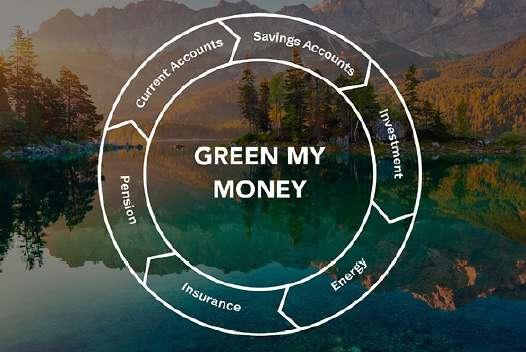
WIN
50% OFF THE MOTHERTREE GREEN LIVING SERVICE
Walk the walk when it comes to sustainability and get peace of mind that your business, bank, pension and bills are good for you, the planet – and your bottom line.
Deadline for entries: 22.03.24
WIN
THE CONSCIOUS WAY PAMPER KIT
Get your paws on the only pet grooming products professionally made in the UK and certified Organic by The Soil Association. This set contains an Organic Dog Wash and an Organic Paw Balm.
Deadline for entries: 07.06.24
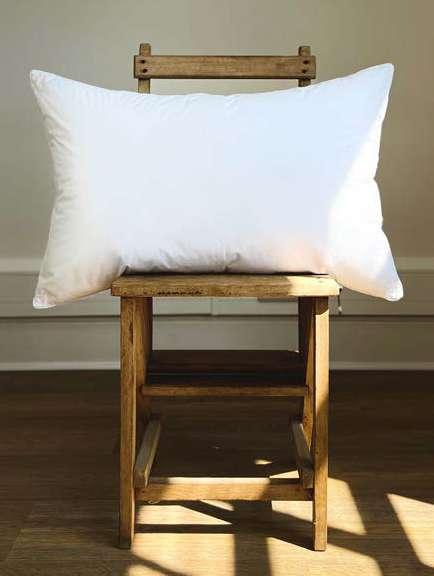
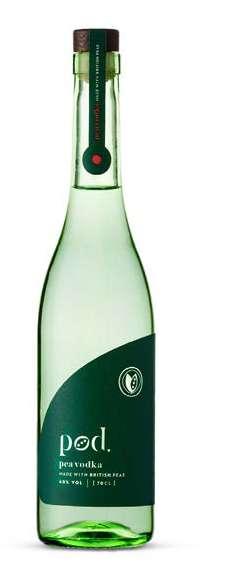
WIN
A BOTTLE OF POD PEA VODKA
Three readers will get to try a bottle of Pod Pea Vodka, a new climatepositive vodka made with 100% British peas. Its unique flavour will give a new twist to classic cocktails – or inspire new experiments!
Deadline for entries: 07.06.24
WIN
WIN
A BIOSNOOZE PILLOW
Three readers will receive a vegan Biosnooze pillow, made from 100% biodegradable, hypoallergenic polyester. The winners can expect to experience all the softness of down without a single feather in sight.
Deadline for entries: 22.03.24
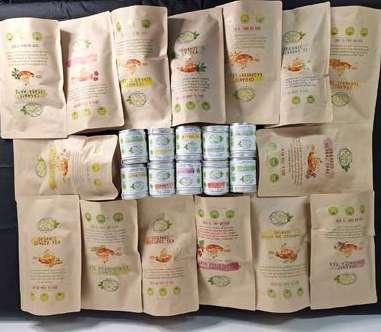
A NATURAL HEALTH MARKET HAMPER
All your organic tea and supplement needs are covered with this bumper pack of organic goodness from The Natural Health Market.
Deadline for entries: 07.06.24
34 INTERNATIONAL WOMEN’S DAY mygreenpod.com
WIN
AN ORGANIC SKINCARE SET FROM HAOMA
Three readers will receive a set of three Organic Deodorants and one Organic Eau de Parfum from Haoma, made from certified organic and foodgrade essential oils for maximum benefits.
Deadline for entries: 22.03.24
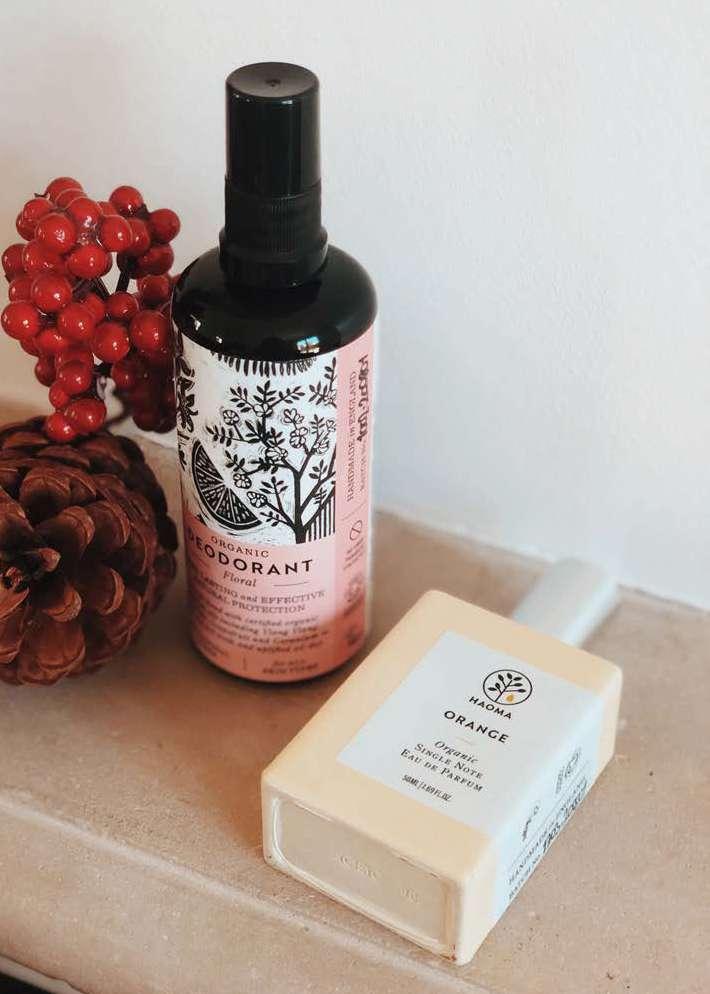
WIN
A SIX-MONTH SUPPLY OF BIRD & WILD COFFEE
One lucky winner will receive 12 200g bags of this delicious coffee, grown in the shade of the rainforest canopy and certified Bird Friendly, Fairtrade and Organic.
Deadline for entries: 07.06.24
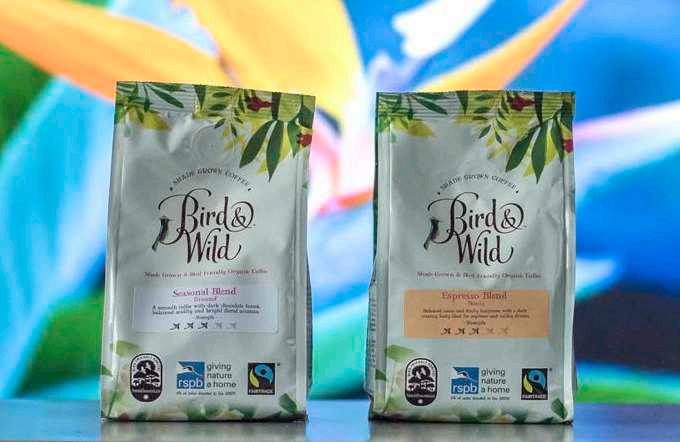
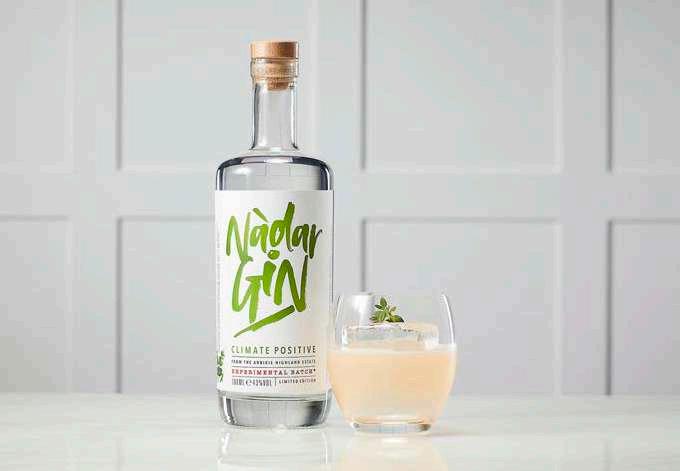
WIN
CLIMATE-POSITIVE SPIRITS FROM ARBIKIE
Three readers will receive a duo of Nàdar Gin and Nàdar Vodka, made from the humble pea! Nàdar means ‘nature’ in Gaelic, and these spirits are helping to fight climate change and biodiversity loss by avoiding more carbon emissions than they produce.
Deadline for entries: 22.03.24
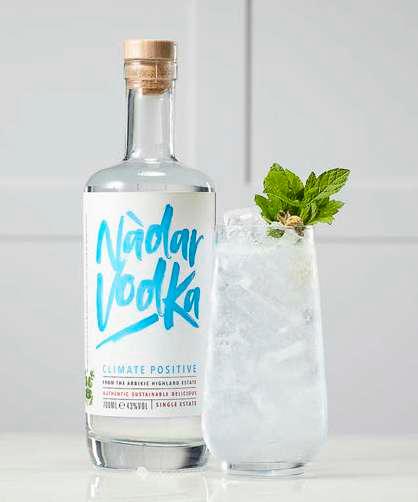

WIN
A TRUE VEDA SPORTS BUNDLE
This is a powerful combination of three organic ayurvedic products known for enhancing flexibility, aiding weight management and boosting energy.
Deadline for entries: 22.03.24
WIN
GINGINGERS
APPLE CIDER VINEGAR GEL
Get your hands on one of six tubes of multipurpose gel to tone, balance and moisturise.
Deadline for entries: 07.06.24
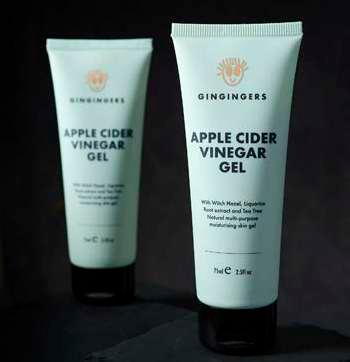
mygreenpod.com INTERNATIONAL WOMEN’S DAY 35





 Hill, EDITOR-IN-CHIEF katie@mygreenpod.com
Hill, EDITOR-IN-CHIEF katie@mygreenpod.com

























































































































































































